Search Result
Results for "
cyclo-oxygenase-2
" in MedChemExpress (MCE) Product Catalog:
11
Isotope-Labeled Compounds
| Cat. No. |
Product Name |
Target |
Research Areas |
Chemical Structure |
-
- HY-B0167S1
-
-
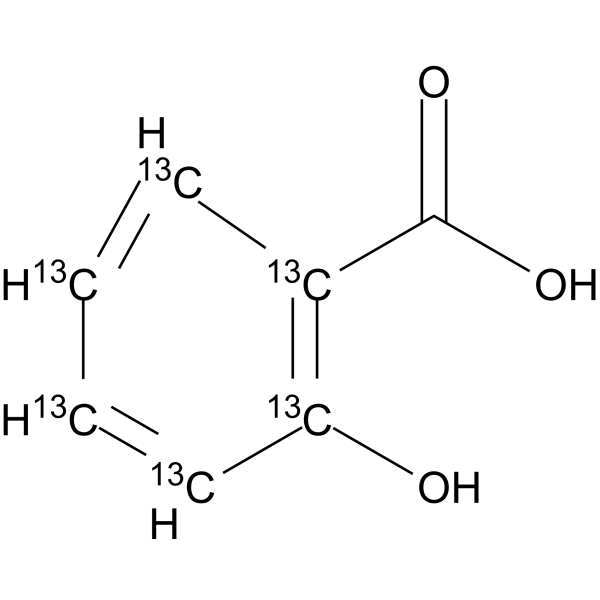
-
- HY-B0167
-
-
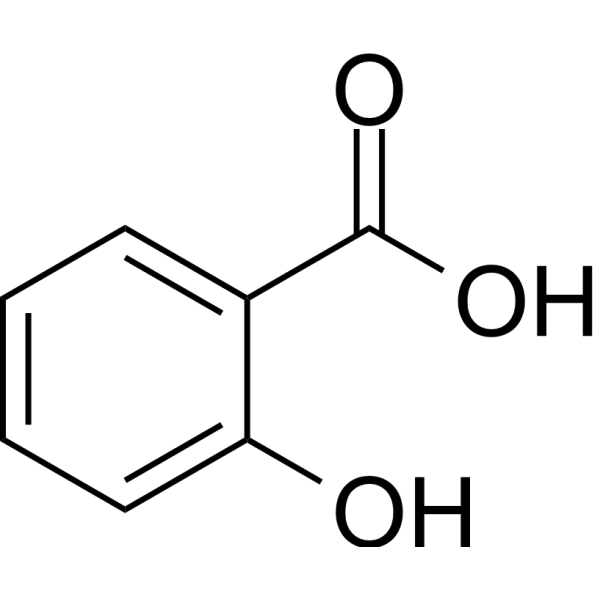
-
- HY-B0167S
-
-
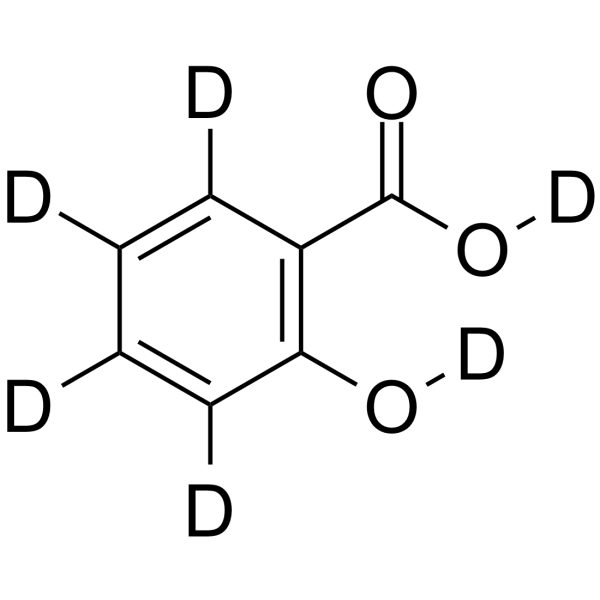
-
- HY-N6893
-
|
|
NF-κB
|
Inflammation/Immunology
|
|
Ergolide is a sesquiterpene lactone isolated from the dried flowers of Inula Britannica. Ergolide inhibits inducible nitric oxide synthase and cyclo-oxygenase-2 expression in RAW 264.7 macrophages through the inactivation of NF-κB .
|
-
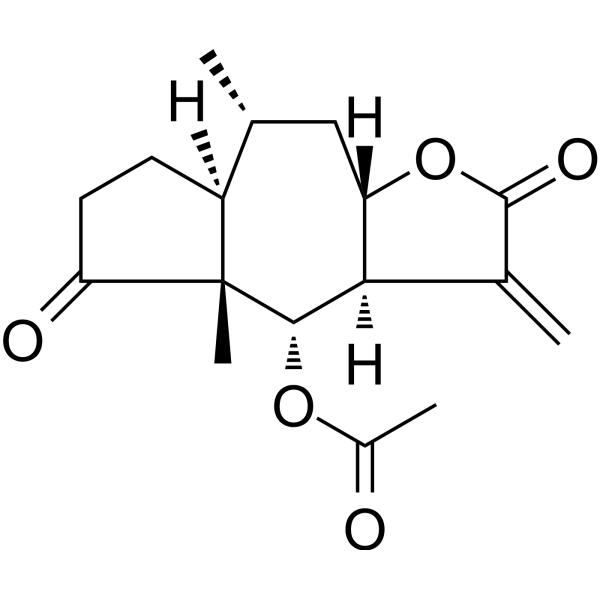
-
- HY-B0167R
-
|
2-Hydroxybenzoic acid (Standard)
|
COX
Autophagy
Mitophagy
Apoptosis
Endogenous Metabolite
|
Inflammation/Immunology
Cancer
|
|
Salicylic acid (Standard) is the analytical standard of Salicylic acid. This product is intended for research and analytical applications. Salicylic acid (2-Hydroxybenzoic acid) inhibits cyclo-oxygenase-2 (COX-2) activity independently of transcription factor (NF-κB) activation .
|
-
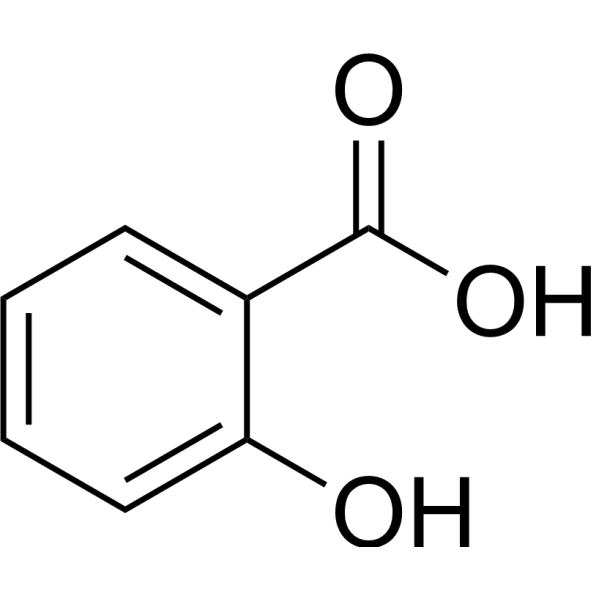
-
- HY-B0167A
-
-
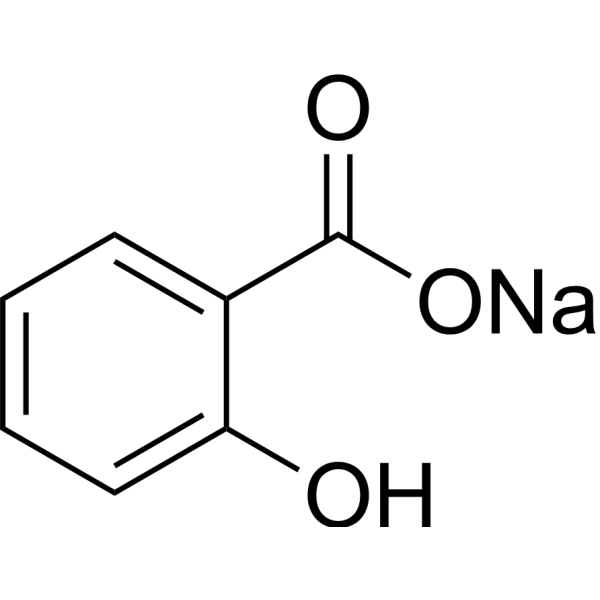
-
- HY-100516
-
|
UR-8880
|
COX
|
Inflammation/Immunology
|
|
Cimicoxib (CX) is an orally active potent and selective COX-2 (cyclo-oxygenase-2) inhibitor. Cimicoxib exhibits promising anti-inflammatory and analgesic activity. The PK parameters of Cimicoxib in dogs given precise (2 mg/kg) and approximate doses (1.95-2.5 mg/kg) are similar .
|
-
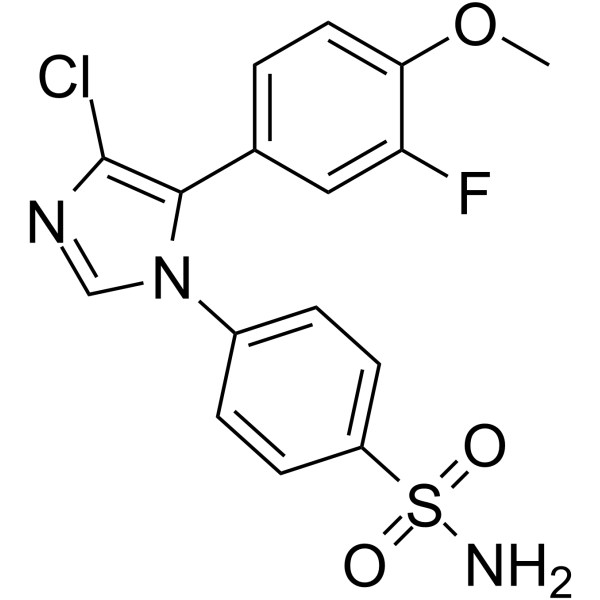
-
- HY-17509
-
|
SC 046; SC 46; SC 59046
|
COX
Apoptosis
|
Inflammation/Immunology
|
|
Deracoxib, a selective cyclooxygenase-2 inhibitor, is a non-narcotic, non-steroidal anti-inflammatory drug (NSAID).
|
-
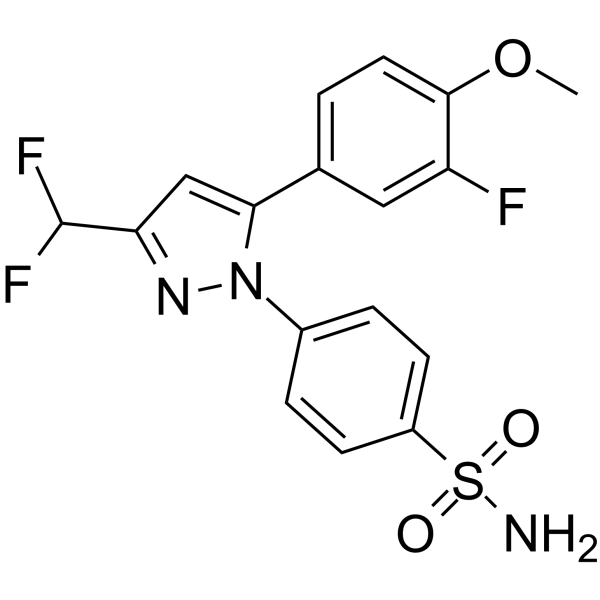
-
- HY-139578
-
|
|
COX
|
Inflammation/Immunology
|
|
Ocarocoxib, a potent COX-2 (cyclooxygenase-2) inhibitor, is a non-steroidal anti-inflammatory for veterinary use .
|
-
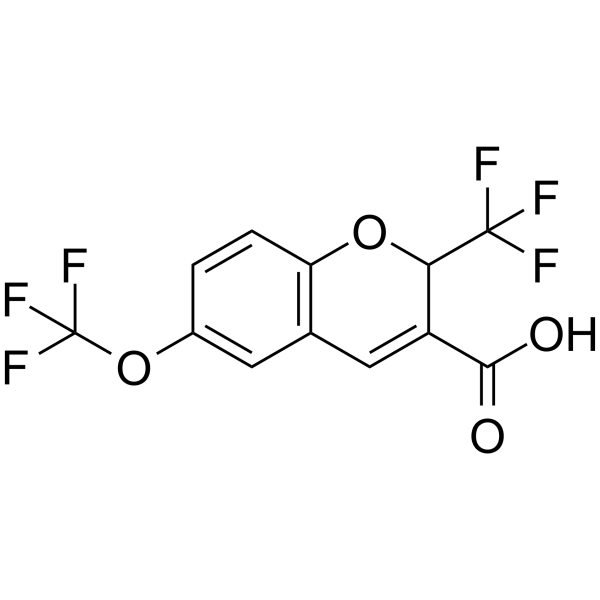
-
- HY-N4230
-
|
|
COX
|
Inflammation/Immunology
|
|
Clematomandshurica saponins B shows significant inhibitory activity on cyclooxygenase-2 (IC50=2.58 mM) .
|
-
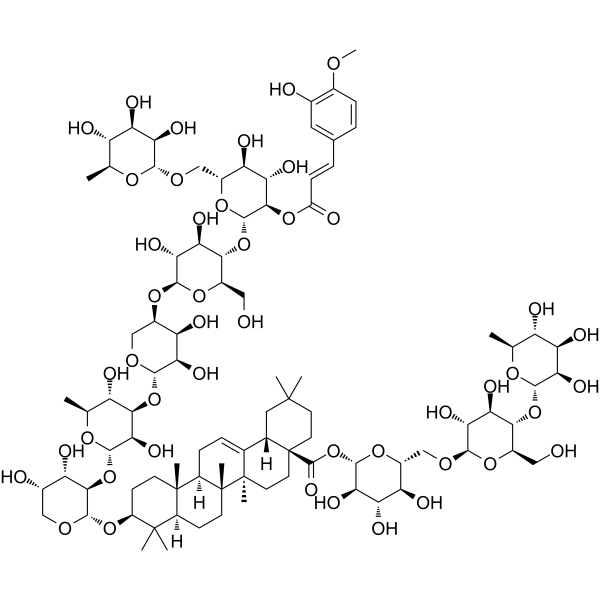
-
- HY-149460
-
|
|
COX
|
Inflammation/Immunology
|
|
Harmaline analog (compound 3) is a selective cyclooxygenase-2 (COX-2) inhibitor with an IC50 of 0.145 μM .
|
-
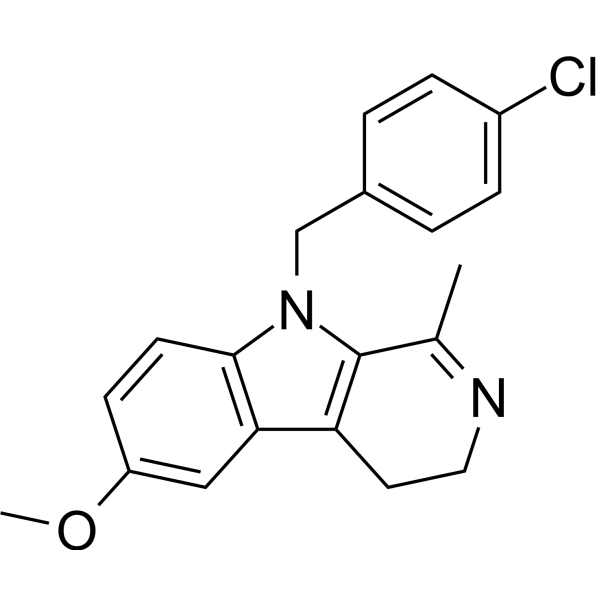
-
- HY-19217
-
|
L-745337
|
COX
|
Inflammation/Immunology
|
|
Thioflosulide (L-745337) is a selective cyclooxygenase-2 (COX2) inhibitor, with an IC50 of 2.3 nM, and shows anti-inflammatory activity.
|
-
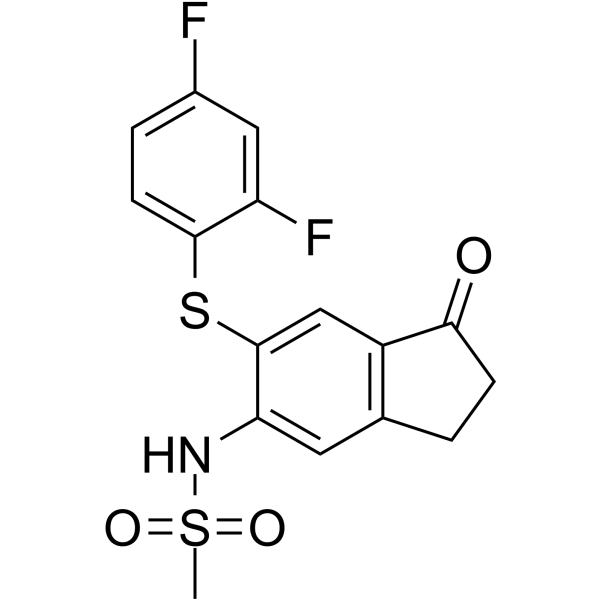
-
- HY-17509S
-
-
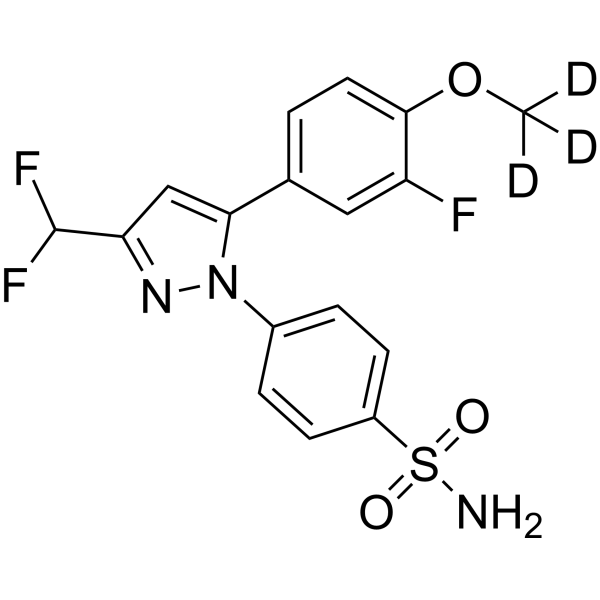
-
- HY-A0273S
-
|
|
COX
|
Inflammation/Immunology
|
|
Propyphenazone-d3 is the deuterium labeled Propyphenazone. Propyphenazone is a pyrazolone derivative with anti-inflammatory, analgesic and antipyretic activity, Propyphenazone-based analogues as proagents and selective cyclooxygenase-2 inhibitors.
|
-
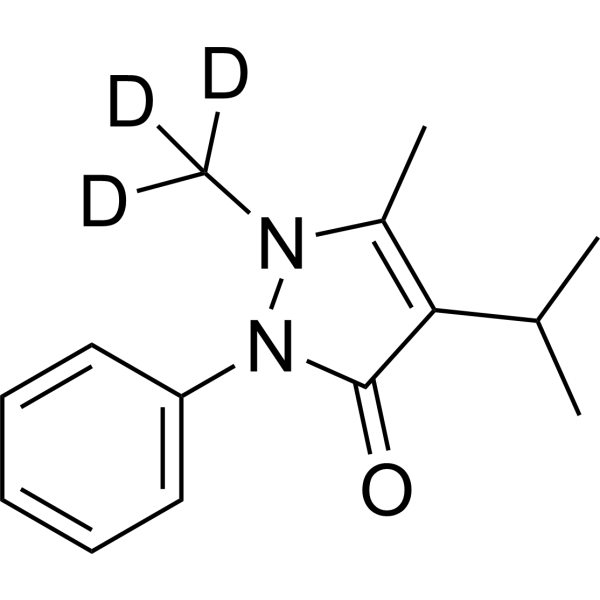
-
- HY-119304
-
-
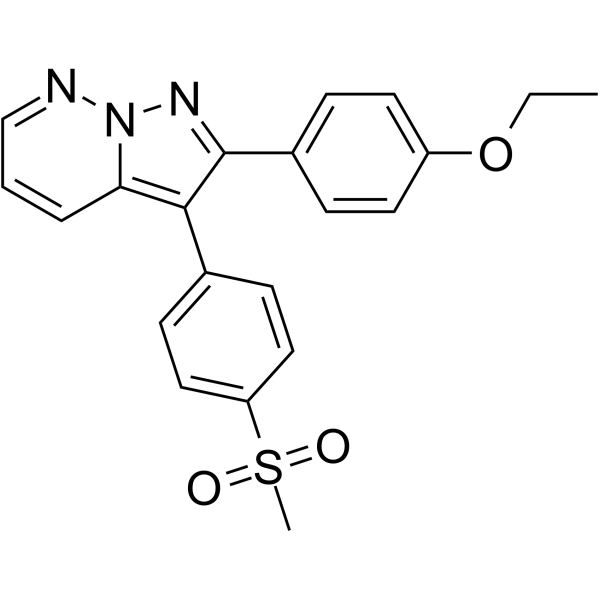
-
- HY-N10303
-
|
|
COX
Parasite
|
Inflammation/Immunology
Cancer
|
|
Withangulatin A is a selective cyclooxygenase-2 (COX-2) inhibitor. Withangulatin A can be isolated from Physalis angulata L. Withangulatin A has anti-tumor, trypanocidal activity and anti-inflammatory function .
|
-
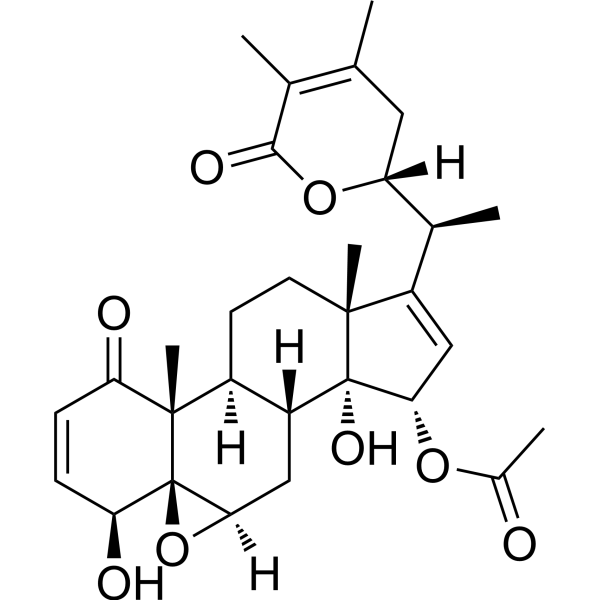
-
- HY-135325
-
|
|
Drug Metabolite
|
Inflammation/Immunology
|
|
4-Hydroxyacetophenone oxime is an impurity of Acetaminophen (Paracetamol). Acetaminophen is a potent cyclooxygenase-2 (COX-2) and hepatic N-acetyltransferase 2 (NAT2) inhibitor, and used antipyretic and analgesic agent [2].
|
-
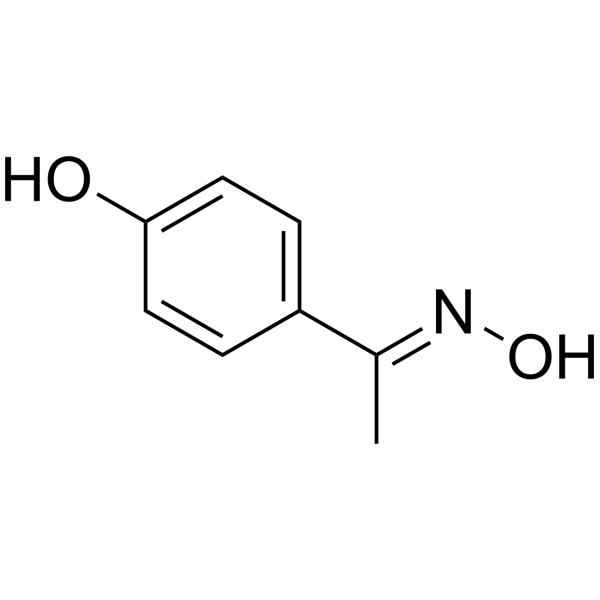
-
- HY-N12254
-
|
|
p38 MAPK
|
Others
|
|
Natsudaidain is a kind of polymethoxyflavone. Natsudaidain can be isolated from Citrus plants. Natsudaidain inhibits tumor necrosis factor-α and cyclooxygenase-2 production n by suppressing p38 MAPK phosphorylation on mast cells .
|
-
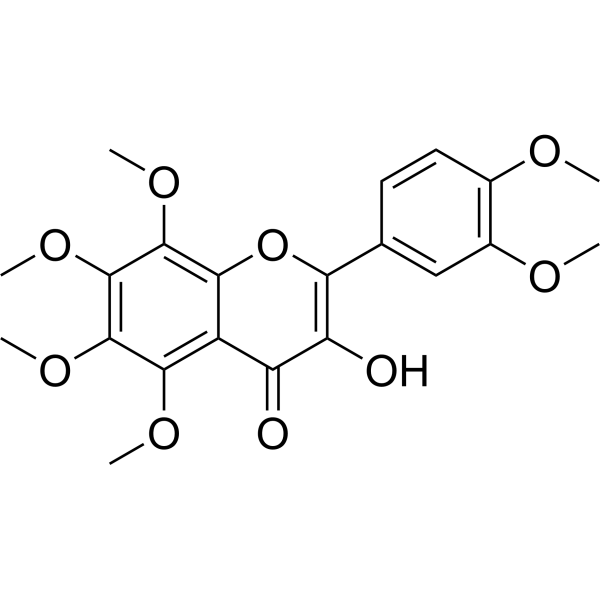
-
- HY-118139
-
|
|
COX
|
Inflammation/Immunology
|
|
Desmethyl Celecoxib (compound 3b) is a selective cyclooxygenase-2 (COX-2) inhibitor (IC50=32 nM) with anti-inflammatory activities. Desmethyl Celecoxib is an analog of Celecoxib and with the optimal yield of 75% .
|
-
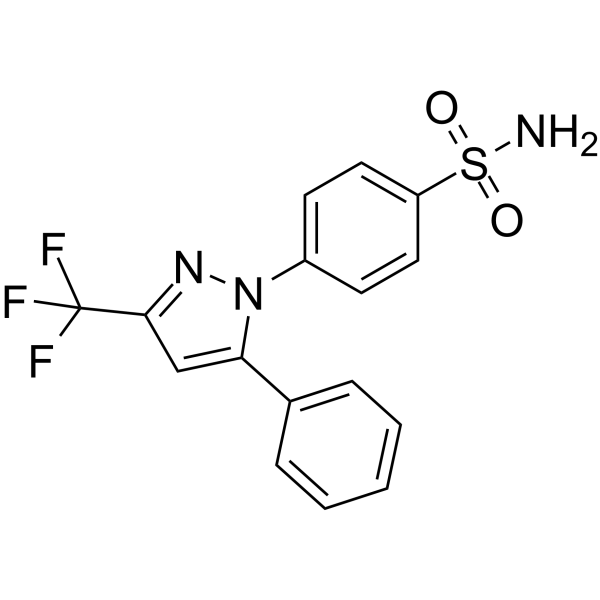
-
- HY-119447
-
|
|
COX
|
Inflammation/Immunology
|
|
Mavacoxib is a selective, oral long-acting cyclooxygenase-2 (COX-2) inhibitor and a long-acting non-steroidal anti-inflammatory drug (NSAID). Mavacoxib is used to treat pain and inflammation associated with degenerative joint disease in dogs .
|
-
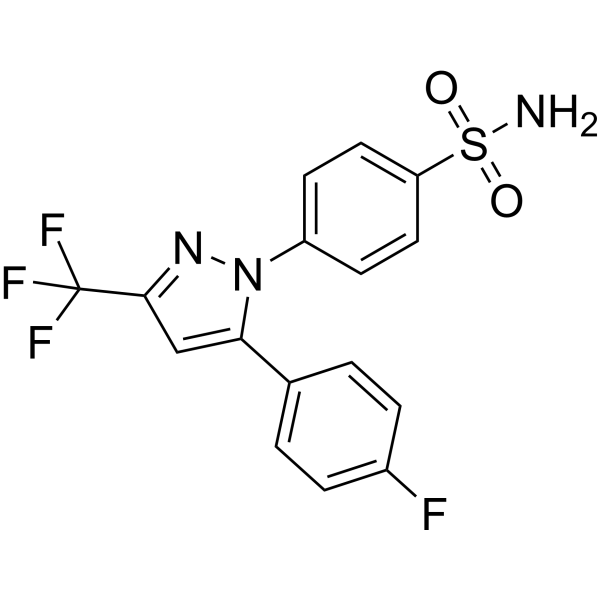
-
- HY-66005
-
-
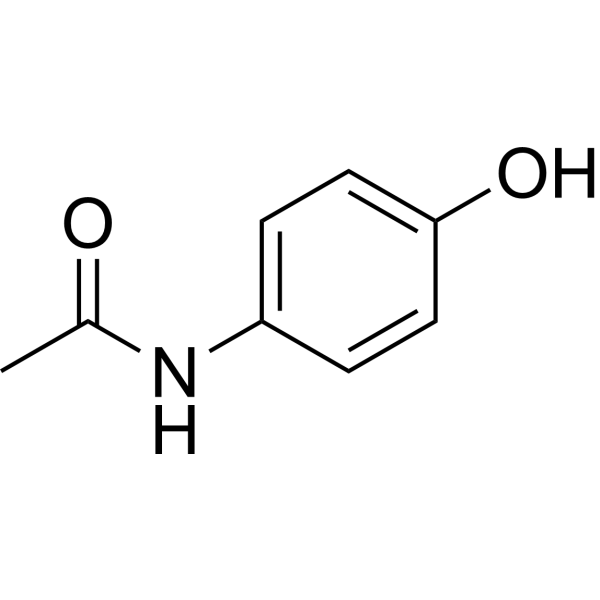
-
- HY-N0523
-
-
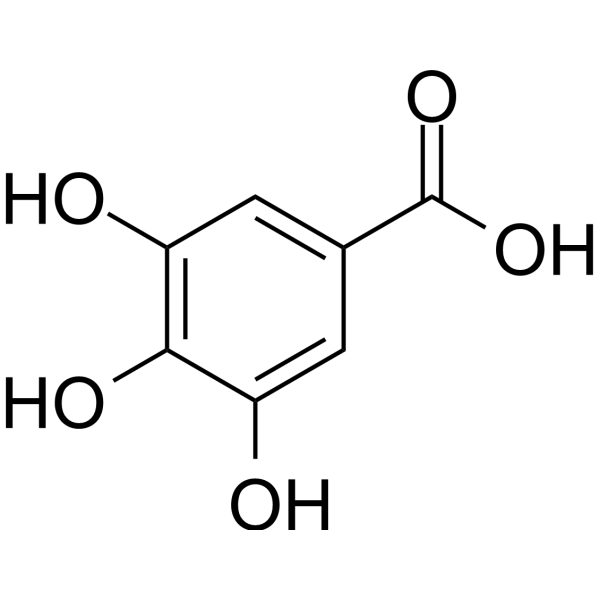
-
- HY-N0523A
-
|
3,4,5-Trihydroxybenzoic acid hydrate
|
|
|
|
Gallic acid (3,4,5-Trihydroxybenzoic acid) hydrate is a natural polyhydroxyphenolic compound and an free radical scavenger to inhibit cyclooxygenase-2 (COX-2) . Gallic acid hydrate has various activities, such as antimicrobial, antioxidant, antimicrobial, anti-inflammatory, and anticance activities [2].
|
-
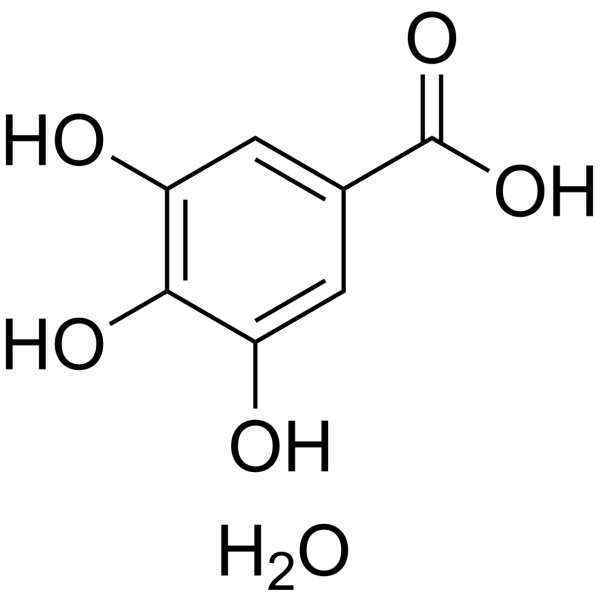
-
- HY-113083
-
|
APAP-glu
|
Drug Metabolite
Endogenous Metabolite
|
Others
|
|
Acetaminophen glucuronide (APAP-glu) is an inactive glucuronide metabolite of Acetaminophen (HY-66005) [2]. Acetaminophen is a selective cyclooxygenase-2 (COX-2) inhibitor and a potent hepatic N-acetyltransferase 2 (NAT2) inhibitor .
|
-
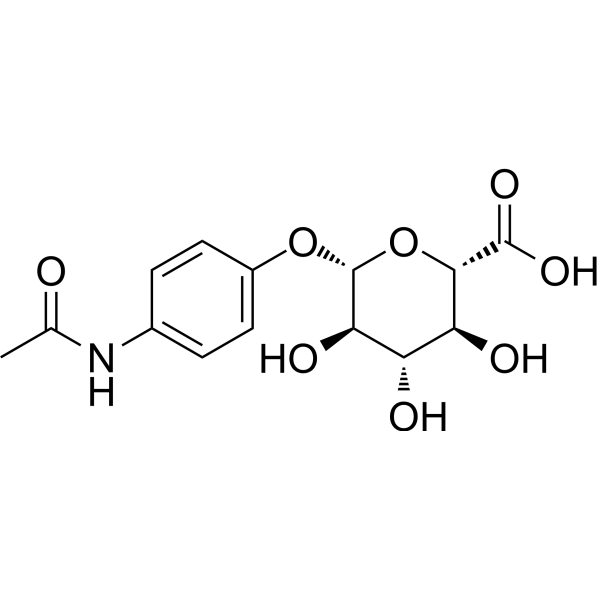
-
- HY-N4044
-
|
(5S)-Hirsutanonol
|
COX
Parasite
|
Infection
Cancer
|
|
Hirsutanonol ((5S)-Hirsutanonol) is a diarylheptanoid that can be isolated from the bark of Alnus hirsute var. sibirica. Hirsutanonol inhibits cyclooxygenase-2 (COX-2) expression. Hirsutanonol has anti-filarial with an IC50 value of 44.11 μg/mL for microfilariae .
|
-
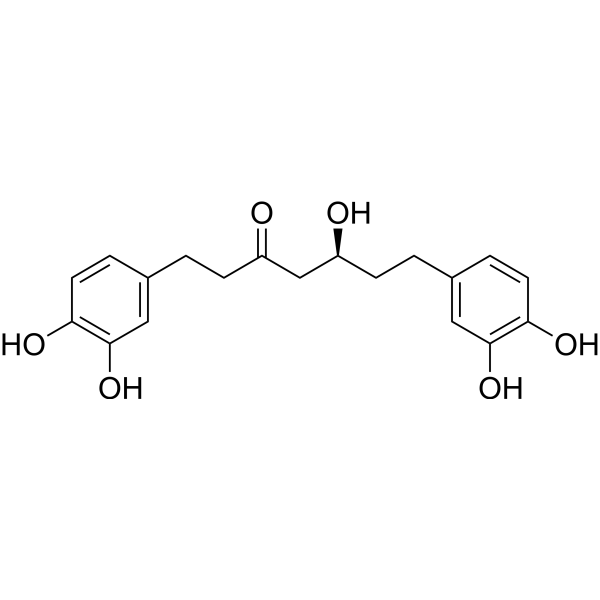
-
- HY-66005S2
-
|
Paracetamol-d7; 4-Acetamidophenol-d7; 4'-Hydroxyacetanilide-d7
|
COX
Endogenous Metabolite
Histone Acetyltransferase
|
Inflammation/Immunology
|
|
Acetaminophen-d7 is the deuterium labeled Acetaminophen. Acetaminophen (Paracetamol) is a selective cyclooxygenase-2 (COX-2) inhibitor with an IC50 of 25.8 μM; is a widely used antipyretic and analgesic agent. Acetaminophen is a potent hepatic N-acetyltransferase 2 (NAT2) inhibitor.
|
-
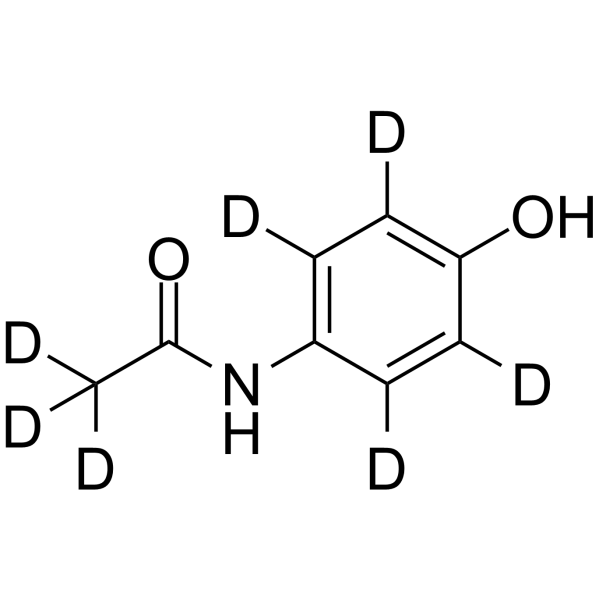
-
- HY-118139S
-
|
|
Isotope-Labeled Compounds
COX
|
Inflammation/Immunology
|
|
Celecoxib-d4 is the deuterium labeled Desmethyl Celecoxib. Desmethyl Celecoxib (compound 3b) is a selective cyclooxygenase-2 (COX-2) inhibitor (IC50=32 nM) with anti-inflammatory activities. Desmethyl Celecoxib is an analog of Celecoxib and with the optimal yield of 75%[1].
|
-
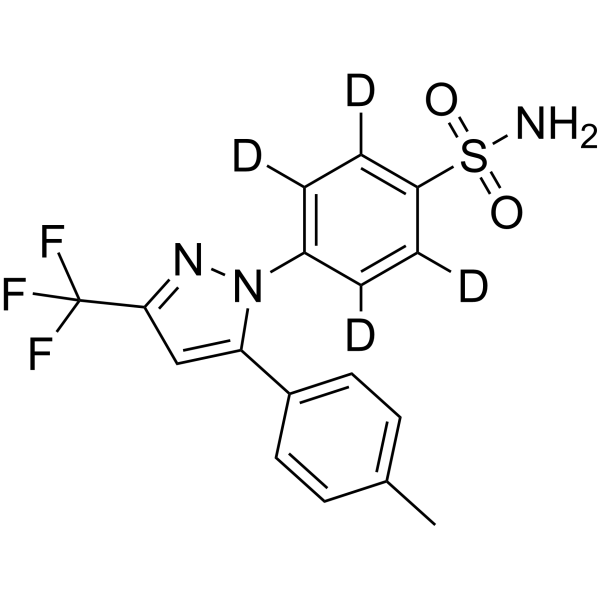
-
- HY-19384
-
|
E 6087
|
|
|
|
Enflicoxib (E 6087) is a nonsteroidal anti-inflammatory compound that selectively inhibits cyclooxygenase-2 (COX-2). Enflicoxib does not inhibit cyclooxygenase-1 (COX-1). E-6087 shows anti-inflammatory, analgesic and antipyretic activities in animal models .
|
-
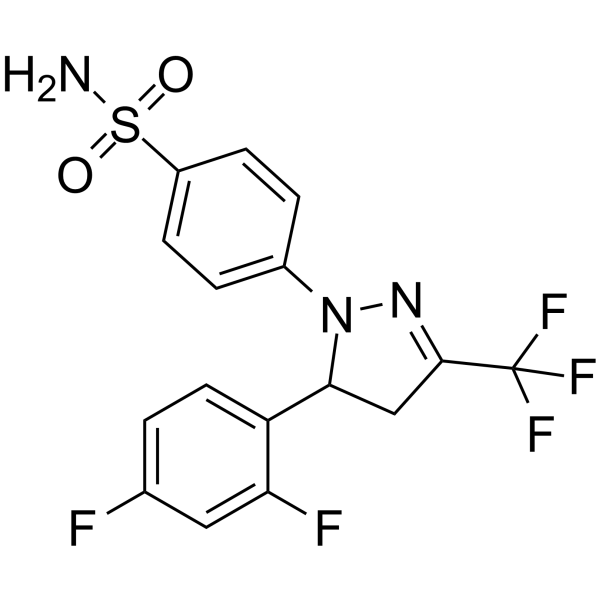
-
- HY-N6966
-
|
|
NF-κB
NO Synthase
COX
PGE synthase
|
Inflammation/Immunology
Cancer
|
|
Ethyl Caffeate is a natural phenolic compound isolated from Bidens pilosa. Ethyl caffeate suppresses NF-κB activation and its downstream inflammatory mediators, inducible nitric oxide synthase (iNOS), cyclooxygenase-2 (COX-2), and prostaglandin E2 (PGE2) in vitro or in mouse skin .
|
-
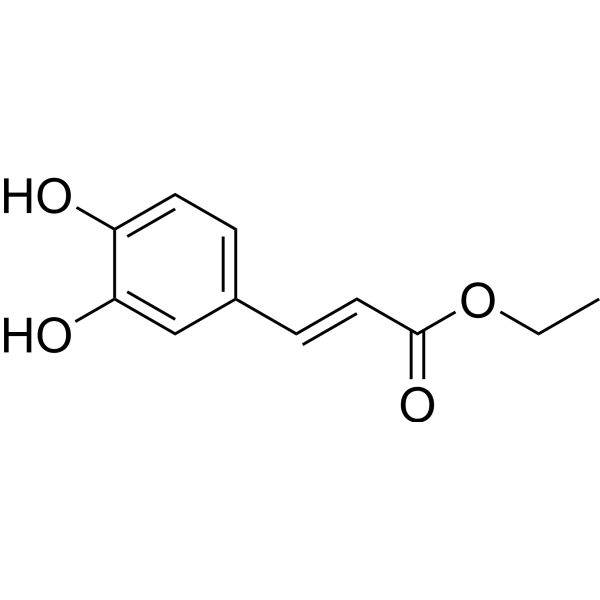
-
- HY-136477
-
|
PGV-1
|
Apoptosis
COX
VEGFR
NF-κB
|
Cancer
|
|
Pentagamavunon-1 (PGV-1), a Curcumin analog with oral activity, targets on several molecular mechanisms to induce apoptosis including inhibition of angiogenic factors cyclooxygenase-2 (COX-2) and vascular endothelial growth factor (VEGF). PGV-1 inhibits NF-κB activation .
|
-
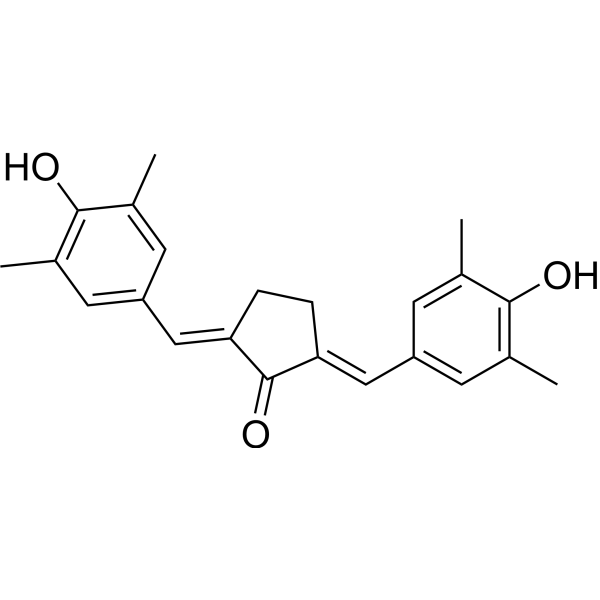
-
- HY-N6084
-
|
α-Lupulic acid
|
COX
GABA Receptor
Apoptosis
|
Cardiovascular Disease
|
|
Humulone (α-Lupulic acid), a prenylated phloroglucinol derivative, is a potent cyclooxygenase-2 (COX-2) inhibitor. Humulone acts as a positive modulator of GABAA receptor at low micromolar concentrations. Humulone is an inhibitor of bone resorption. Humulone possesses antioxidant, anti-angiogenic and apoptosis-inducing properties [2] .
|
-
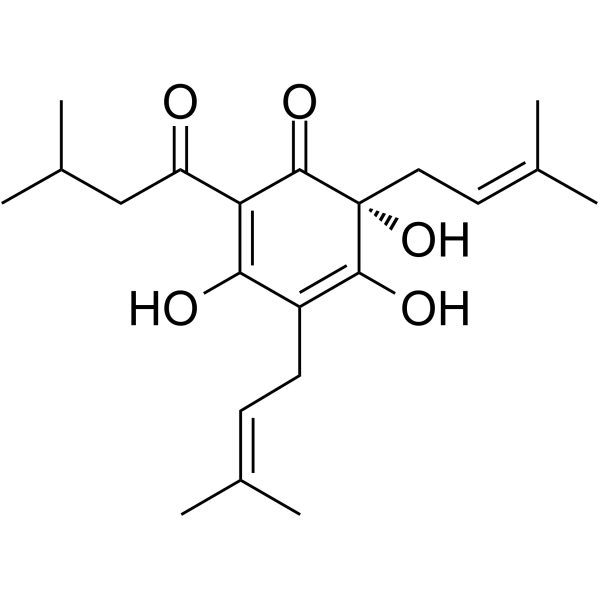
-
- HY-119447S
-
|
|
Isotope-Labeled Compounds
COX
|
Inflammation/Immunology
|
|
Mavacoxib-d4 is the deuterium labeled Mavacoxib. Mavacoxib is a selective, oral long-acting cyclooxygenase-2 (COX-2) inhibitor and a long-acting non-steroidal anti-inflammatory drug (NSAID). Mavacoxib is used to treat pain and inflammation associated with degenerative joint disease in dogs[1].
|
-
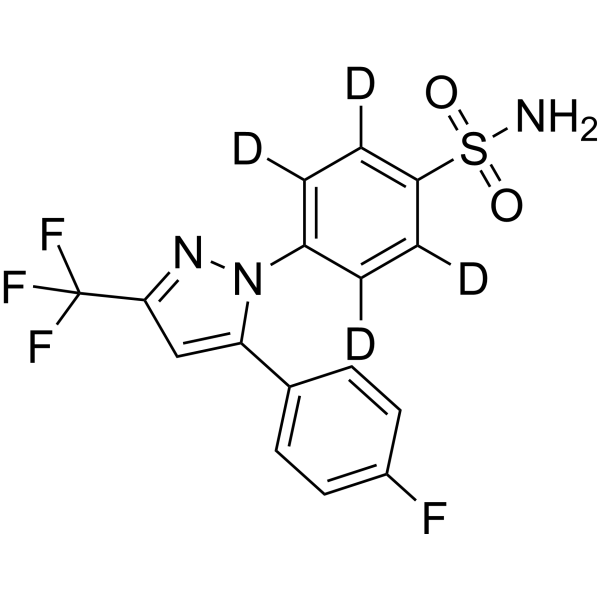
-
- HY-66005S1
-
|
Paracetamol-d3; 4-Acetamidophenol-d3; 4'-Hydroxyacetanilide-d3
|
COX
Histone Acetyltransferase
Endogenous Metabolite
|
Inflammation/Immunology
|
|
Acetaminophen-d3 is the deuterium labeled Acetaminophen. Acetaminophen (Paracetamol) is a selective cyclooxygenase-2 (COX-2) inhibitor with an IC50 of 25.8 μM; is a widely used antipyretic and analgesic agent[1][2][3]. Acetaminophen is a potent hepatic N-acetyltransferase 2 (NAT2) inhibitor[4].
|
-
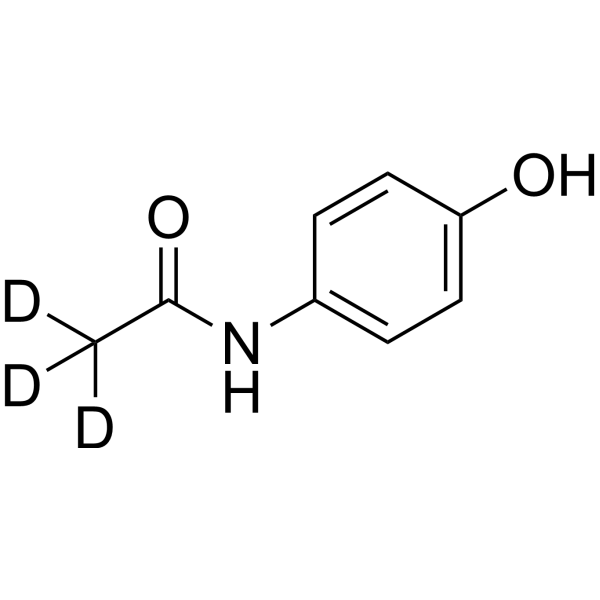
-
- HY-66005S
-
|
Paracetamol-d4; 4-Acetamidophenol-d4; 4'-Hydroxyacetanilide-d4
|
COX
Histone Acetyltransferase
Endogenous Metabolite
|
Inflammation/Immunology
|
|
Acetaminophen-d4 is the deuterium labeled Acetaminophen. Acetaminophen (Paracetamol) is a selective cyclooxygenase-2 (COX-2) inhibitor with an IC50 of 25.8 μM; is a widely used antipyretic and analgesic agent[1][2][3]. Acetaminophen is a potent hepatic N-acetyltransferase 2 (NAT2) inhibitor[4].
|
-
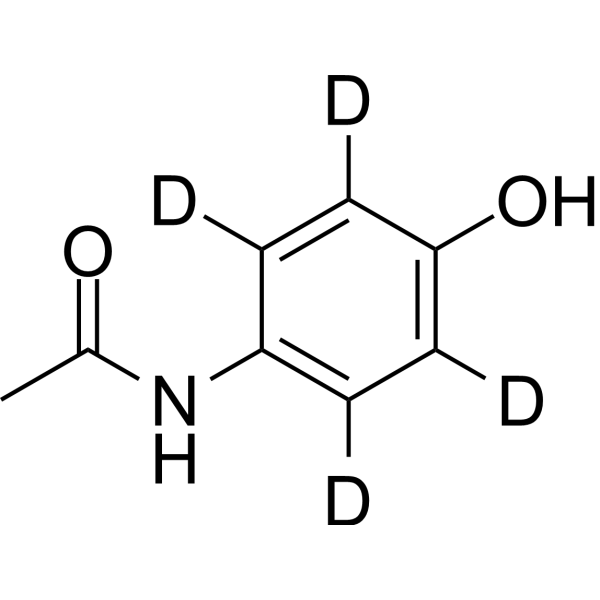
-
- HY-66005R
-
|
Paracetamol (Standard); 4-Acetamidophenol (Standard); 4'-Hydroxyacetanilide (Standard)
|
COX
Histone Acetyltransferase
Endogenous Metabolite
Bacterial
Parasite
|
Inflammation/Immunology
Cancer
|
|
Acetaminophen (Standard) is the analytical standard of Acetaminophen. This product is intended for research and analytical applications. Acetaminophen (Paracetamol) is a selective cyclooxygenase-2 (COX-2) inhibitor with an IC50 of 25.8 μM; is a widely used antipyretic and analgesic agent [2] . Acetaminophen is a potent hepatic N-acetyltransferase 2 (NAT2) inhibitor .
|
-
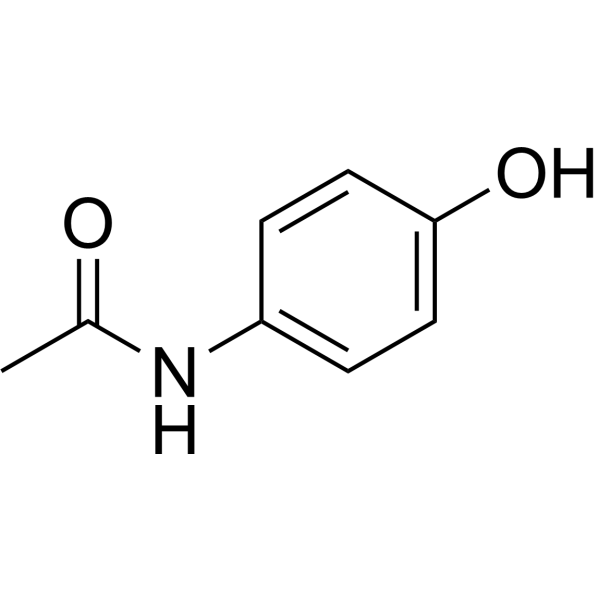
-
- HY-147748
-
|
|
COX
|
Inflammation/Immunology
|
|
COX-2-IN-17 (compound 10) is a potent and BBB-penetrated COX-2 (cyclooxygenase-2) inhibitor, with an IC50 of 0.02 μM. COX-2-IN-17 shows anti-inflammatory and analgesic activities. COX-2-IN-17 attenuates hyperalgesia in the neurogenic phase as well as the inflammatory phase .
|
-
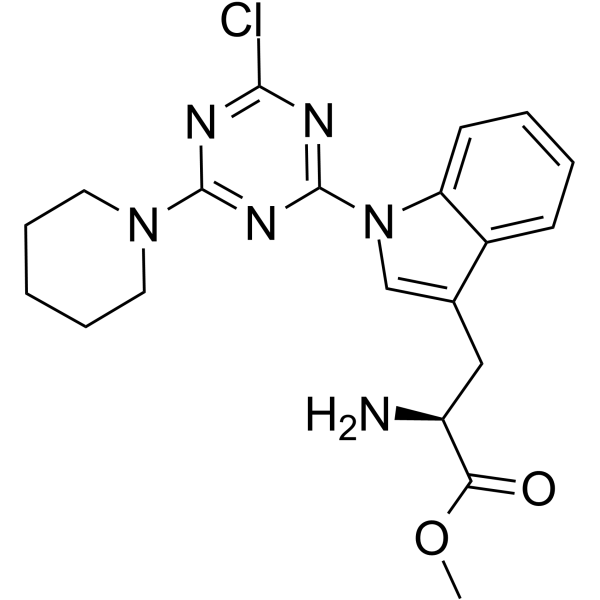
-
- HY-N0523S
-
|
3,4,5-Trihydroxybenzoic acid-d2
|
Apoptosis
COX
Ferroptosis
Endogenous Metabolite
Reactive Oxygen Species
|
|
|
Gallic acid-d2 is the deuterium labeled Gallic acid[1]. Gallic acid (3,4,5-Trihydroxybenzoic acid) is a natural polyhydroxyphenolic compound and an free radical scavenger to inhibit cyclooxygenase-2 (COX-2)[2]. Gallic acid has various activities, such as antimicrobial, antioxidant, antimicrobial, anti-inflammatory, and anticance activities[3].
|
-
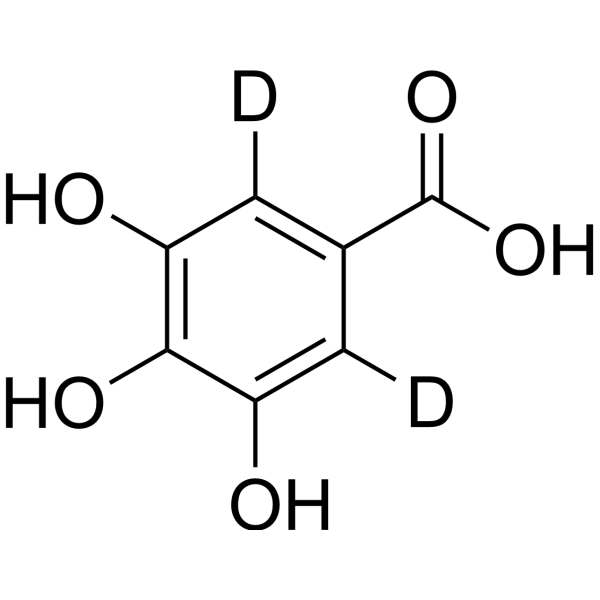
-
- HY-W028263
-
|
|
COX
Opioid Receptor
GABA Receptor
Lipoxygenase
|
Metabolic Disease
Inflammation/Immunology
|
|
6-Hydroxyflavanone is a compound that can be isolated from the Muntingia calabura leaves. 6-Hydroxyflavanone targets cyclooxygenase-2 (COX-2), 5-lipoxygenase (5-LOX), and opioid and GABA-A receptors that has anti-inflammatory and anti-neuropathic pain potential. 6-Hydroxyflavanone can be used for the research of diabetes [2].
|
-
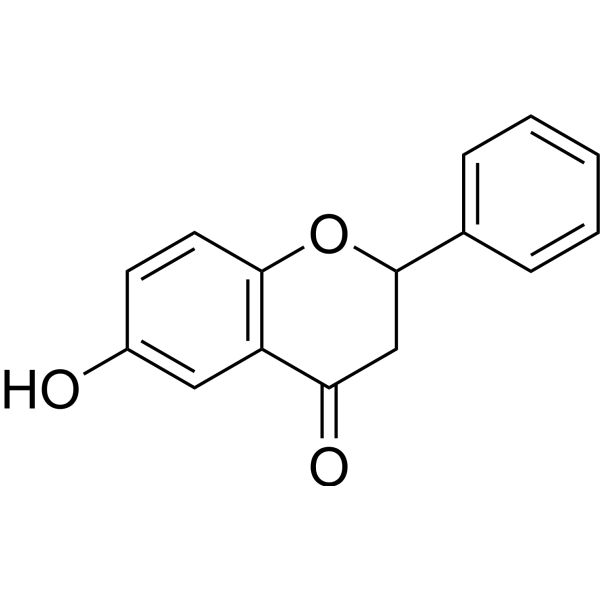
-
- HY-66005S4
-
|
Paracetamol-13C2,15N; 4-Acetamidophenol-13C2,15N; 4'-Hydroxyacetanilide-13C2,15N
|
COX
Bacterial
Histone Acetyltransferase
Parasite
Endogenous Metabolite
|
|
|
Acetaminophen- 13C2, 15N is the 13C and 15N labeled Acetaminophen[1]. Acetaminophen (Paracetamol) is a selective cyclooxygenase-2 (COX-2) inhibitor with an IC50 of 25.8 μM;is a widely used antipyretic and analgesic agent[2][3][4]. Acetaminophen is a potent hepatic N-acetyltransferase 2 (NAT2) inhibitor[5].
|
-
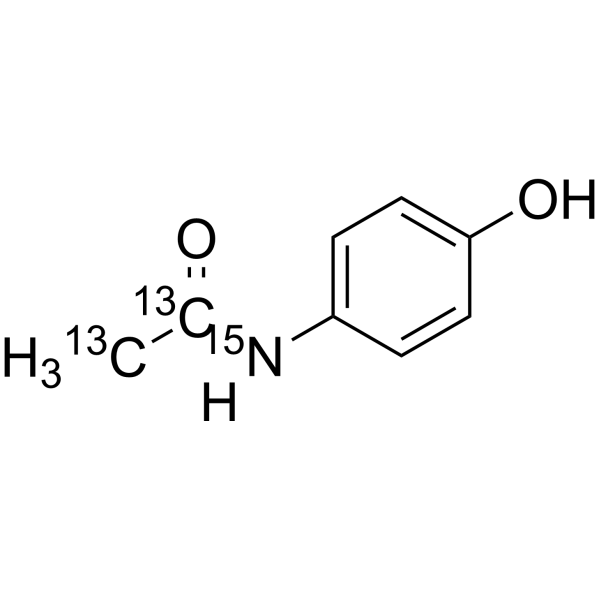
-
- HY-N0074
-
|
|
COX
|
Inflammation/Immunology
|
|
Byakangelicol, isolated from Angelica dahurica, inhibits interleukin-1beta (IL-1beta) -induced prostaglandin E2 (PGE2) release in A549 cells mediated by suppression of cyclooxygenase-2 (COX-2) expression and the activity of COX-2 enzyme. Byakangelicol has therapeutic potential as an anti-inflammatory agent on airway inflammation .
|
-
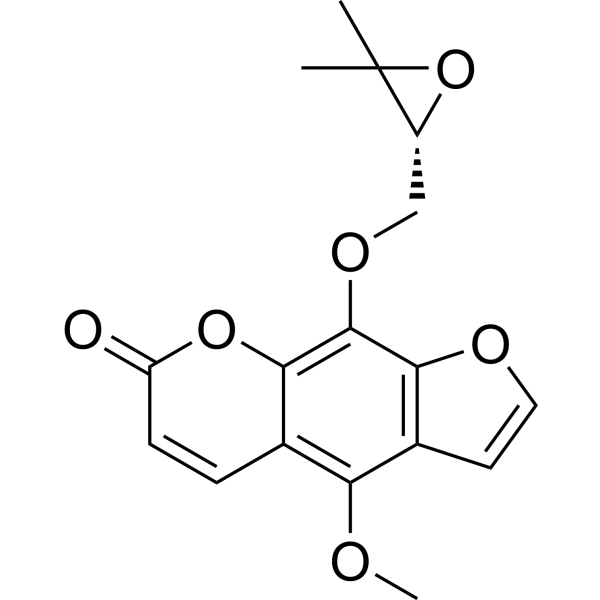
-
- HY-147692
-
|
|
COX
|
Inflammation/Immunology
|
|
COX-2-IN-14 (compound 2a) is a potent and selective COX-2 (cyclooxygenase-2) inhibitor. COX-2-IN-14 shows effective binding at the active site of COX-2 co-crystal. COX-2-IN-14 exhibits a high level of in vivo anti-inflammatory activity, reducing ear edema and myeloperoxidase (MPO) activity in mice .
|
-
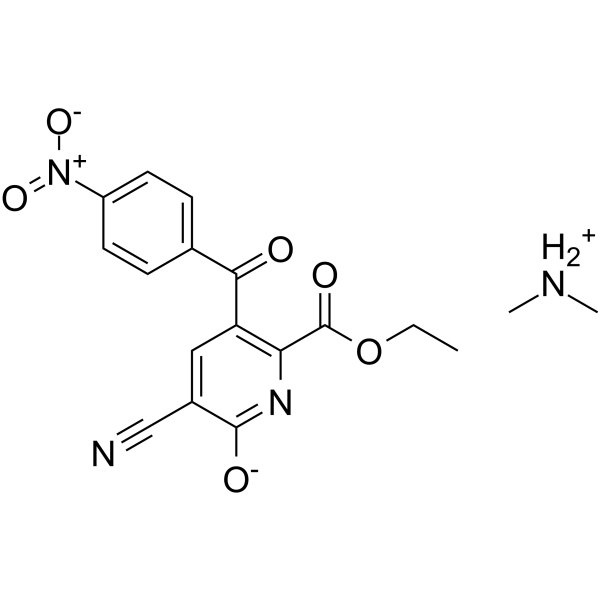
-
- HY-N6966A
-
|
|
Others
|
Inflammation/Immunology
|
|
Ethyl trans-caffeate is the trans form of Ethyl Caffeate (HY-N6966). Ethyl Caffeate is a natural phenolic compound isolated from Bidens pilosa. Ethyl caffeate suppresses NF-κB activation and its downstream inflammatory mediators, inducible nitric oxide synthase (iNOS), cyclooxygenase-2 (COX-2), and prostaglandin E2 (PGE2) in vitro or in mouse skin .
|
-
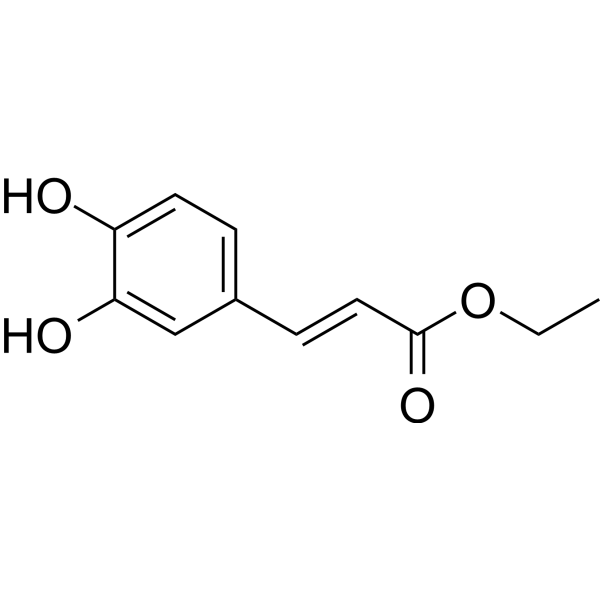
-
- HY-137004
-
|
Ind-Cl
|
Estrogen Receptor/ERR
COX
|
Inflammation/Immunology
|
|
Indazole-Cl (Ind-Cl) is an Estrogen receptor (ER)-β-specific agonist with inflammatory effect. Indazole-Cl inhibits cyclooxygenase-2 exression reduction induced by hypoxia. And Indazole-Cl inhibits ROS production. Indazole-Cl also inhibits cell migration and invasion by hypoxia increased by hypoxia. Indazole-Cl is potent inhibitor of hypoxia-induced inflammation in vascular smooth muscle cells (VSMCs) .
|
-
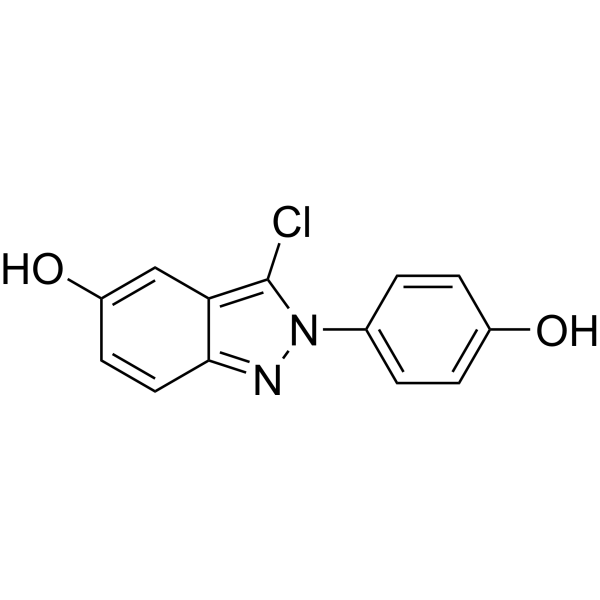
-
- HY-N7012
-
|
5-Hydroxy-3',4',7-trimethoxyflavone
|
TNF Receptor
Interleukin Related
COX
|
Inflammation/Immunology
|
|
7,3',4'-Tri-O-methylluteolin (5-Hydroxy-3',4',7-trimethoxyflavone), a flavonoid compound, possesses potent anti-inflammatory effects in LPS-induced macrophage cell line mediated by inhibition of release of inflammatory mediators, NO, PGE2, and pro-inflammatory cytokines. 7,3',4'-Tri-O-methylluteolin significantly induces reduction in the mRNA expressions of inducible nitric oxide synthase and cyclooxygenase-2 .
|
-
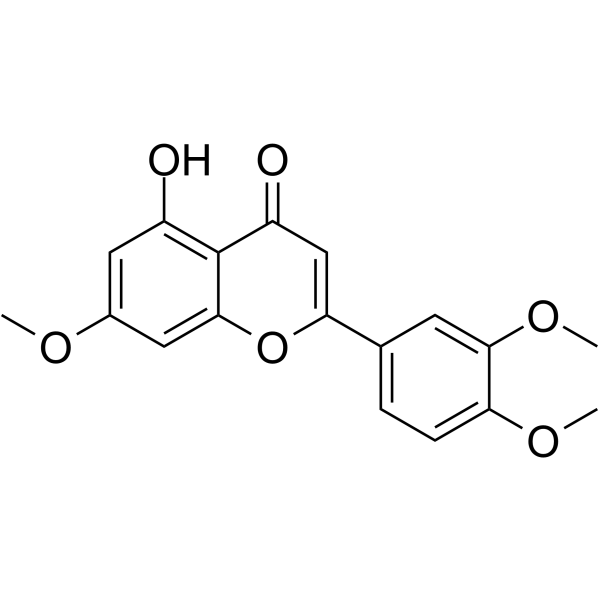
-
- HY-115866
-
|
|
COX
|
Cancer
|
|
COX-2-IN-6 (compound 10) is an orally active, gut-restricted and selective cyclooxygenase-2 (COX-2) inhibitor for colorectal Chemoprevention of cancer. COX-2-IN-6 selectively targets COX-2 with an IC50 of 0.84 μM and a Ki of 69 nM. COX-2-IN-6 also inhibits COX-2-driven PGE2 synthesis with an IC50 of 0.60 μM .
|
-
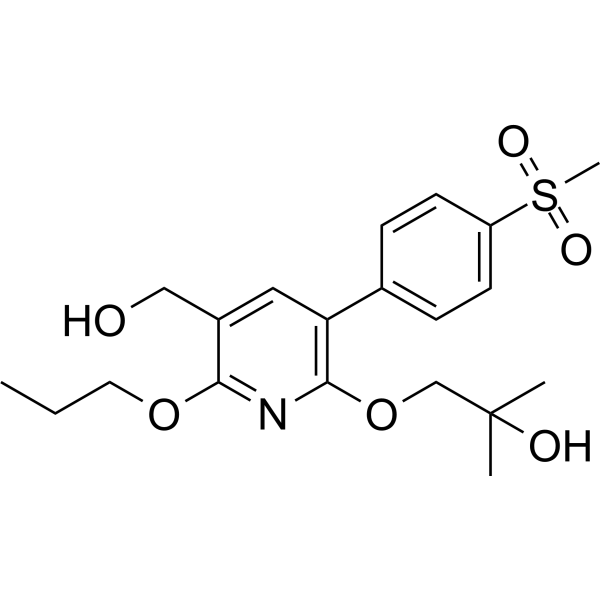
-
- HY-N0632
-
|
|
COX
NF-κB
|
Inflammation/Immunology
|
|
Esculentoside A (EsA), a kind of triterpene saponin isolated from roots of Phytolacca esculenta .
Esculentoside A (EsA) possesses anti-inflammatory activity in acute and chronic experimental models [2], has selective inhibitory activity towards cyclooxygenase-2 (COX-2) .
Esculentoside A (EsA) suppresses inflammatory responses in LPS-induced acute lung injury (ALI) through inhibition of the nuclear factor kappa B (NF-ΚB) and mitogen activated protein kinase (MAPK) signaling pathways .
|
-
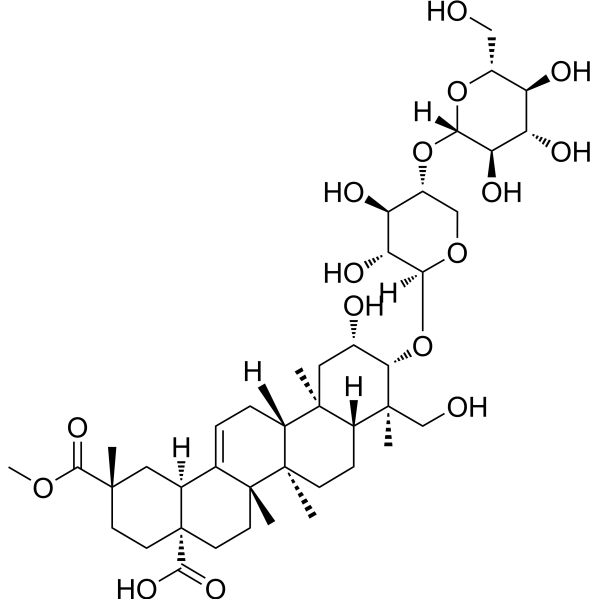
-
- HY-121537
-
|
|
COX
Akt
Apoptosis
|
Neurological Disease
Inflammation/Immunology
Cancer
|
|
CAY10404 is a potent and selective cyclooxygenase-2 (COX-2) inhibitor with an IC50 of 1 nM and a selectivity index (SI; COX-1 IC50/COX-2 IC50) of >500000. CAY10404 is a potent PKB/Akt and MAPK signaling pathways inhibitor and induces apoptosis in non-small cell lung cancer (NSCLC) cells. CAY10404, a diarylisoxazole, has good analgesic, anti-inflammatory, and anti-cancer activities [2] .
|
-
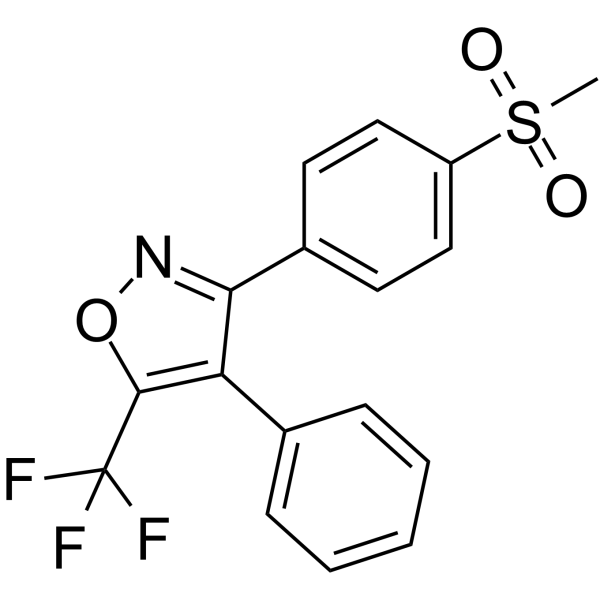
-
- HY-N8936
-
|
|
Others
|
Inflammation/Immunology
|
|
Narchinol B (Compound 4) is a sesquiter penoid
compound. Narchinol B has anti-inflammatory effects. Narchinol B works by
inhibiting proinflammatory mediators, including prostaglandin E2 (PGE2),
inducible nitric oxide synthase (iNOS), and cyclooxygenase-2 (COX-2) proteins,
as well as proinflammatory cytokines, such as interleukin-1b, IL-6, and tumor
necrosis factor-α (TNF-α). Narchinol B significantly inhibits LPS-induced
overproduction of NO in BV2 cells (IC50=2.43 μM)
.
|
-
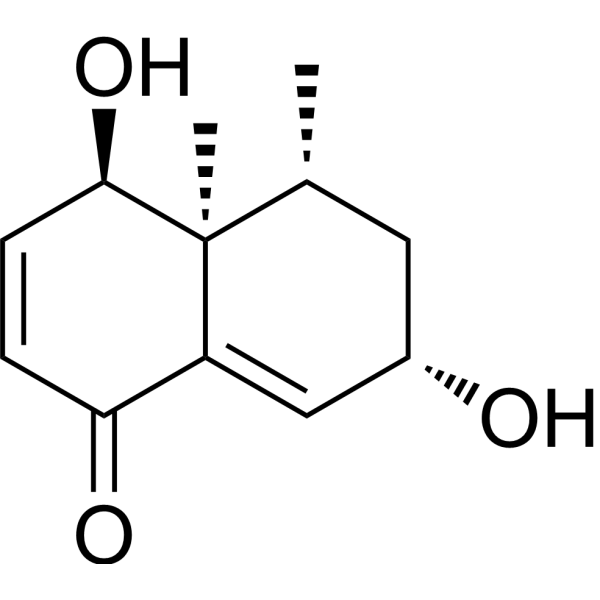
-
- HY-P0031
-
|
|
Integrin
|
Others
|
|
Cyclo(RADfK) is a selective α(v)β(3) integrin ligand that has been extensively used for research, therapy, and diagnosis of neoangiogenesis.
|
-
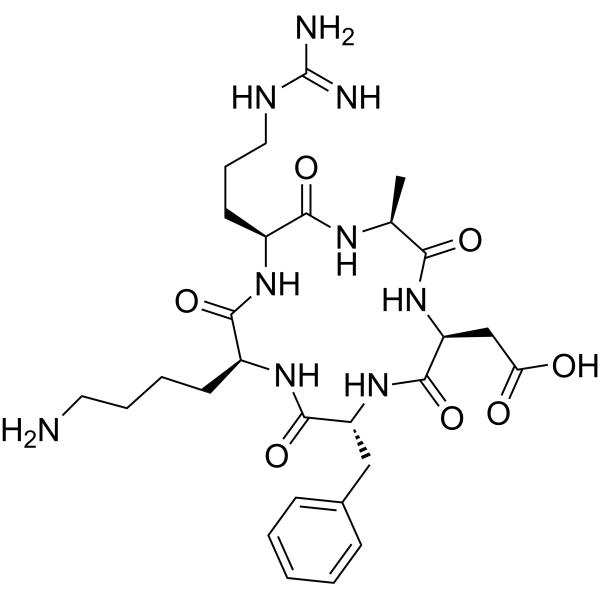
-
- HY-101402
-
|
cyclo(histidyl-proline); Histidylproline diketopiperazine
|
NF-κB
Endogenous Metabolite
|
Neurological Disease
Inflammation/Immunology
|
|
Cyclo(his-pro) (Cyclo(histidyl-proline)) is an orally active cyclic dipeptide structurally related to tyreotropin-releasing hormone . Cyclo(his-pro) could inhibit NF-κB nuclear accumulation. Cyclo(his-pro) can cross the brain-blood-barrier and affect diverse inflammatory and stress responses [2].
|
-
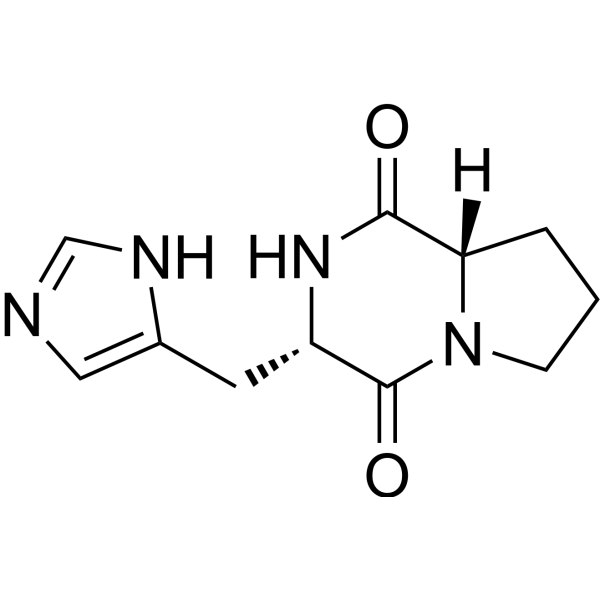
- HY-P0023
-
|
|
Integrin
|
Cancer
|
|
Cyclo(-RGDfK) is a potent and selective inhibitor of the αvβ3 integrin, with an IC50 of 0.94 nM . Cyclo(-RGDfK) TFA potently targets tumor microvasculature and cancer cells through the specific binding to the αvβ3 integrin on the cell surface [2].
|
-
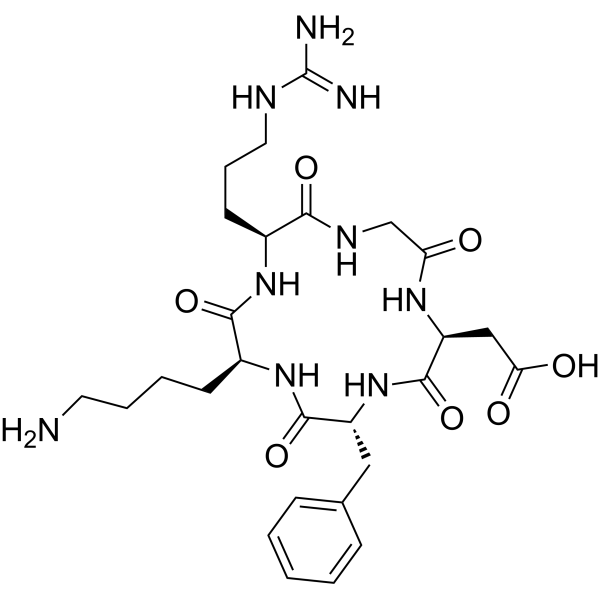
- HY-P0231
-
-
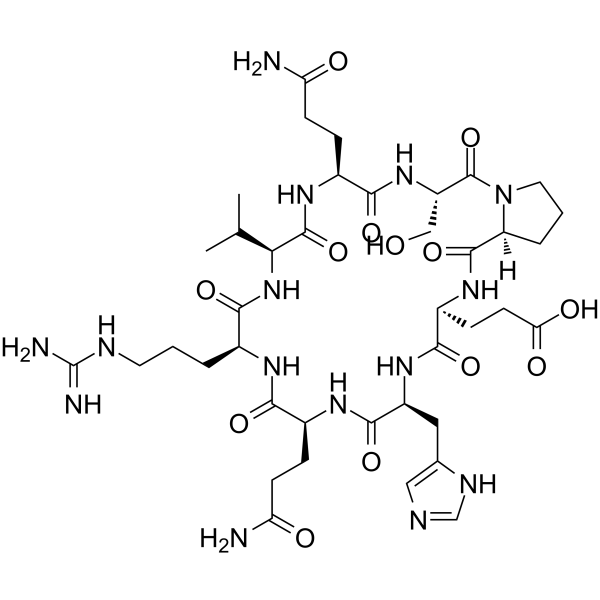
- HY-P1934
-
|
cyclo(phenylalanylprolyl); A-64863
|
HCV
|
Infection
|
|
Cyclo(Phe-Pro) (Cyclo(phenylalanylprolyl)), a Vibrio vulnificus quorum-sensing molecule, inhibits retinoic acid-inducible gene-I (RIG-I) polyubiquitination, through its specific interaction with RIG-I, to blunt IRF-3 activation and type-I IFN production. Cyclo(Phe-Pro) (Cyclo(phenylalanylprolyl)) enhances susceptibility to hepatitis C virus (HCV), as well as Sendai and influenza viruses .
|
-
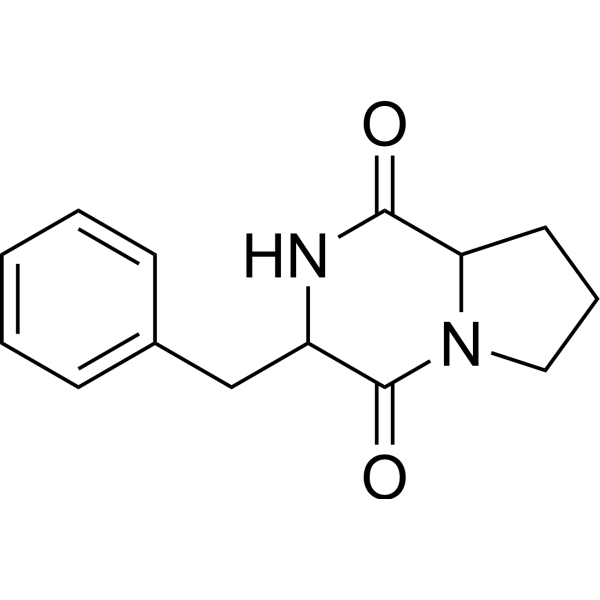
- HY-126810A
-
|
|
Fungal
|
Infection
|
|
NP213 TFA is a rapidly acting, novel, first-in-class synthetic antimicrobial peptide (AMP), has anti-fungal activities. NP213 TFA targets the fungal cytoplasmic membrane and plays it role via membrane perturbation and disruption. NP213 TFA is effective and well-tolerated in resolving nail fungal infections [2].
|
-
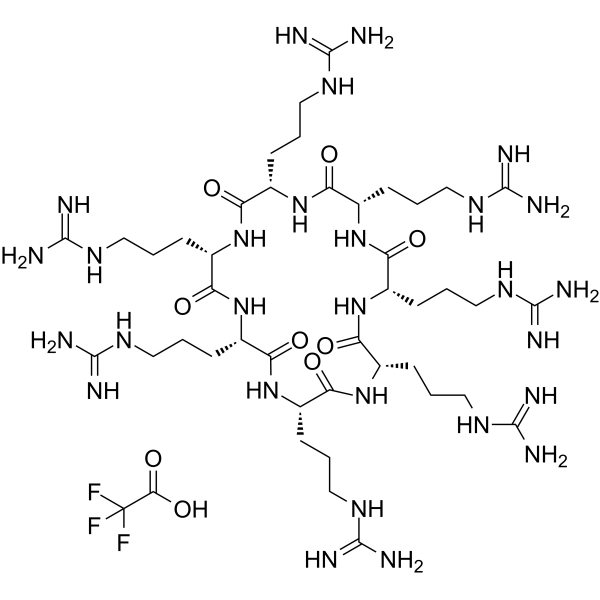
- HY-P0023A
-
|
|
Integrin
|
Cancer
|
|
Cyclo(-RGDfK) TFA is a potent and selective inhibitor of the αvβ3 integrin, with an IC50 of 0.94 nM . Cyclo(-RGDfK) TFA potently targets tumor microvasculature and cancer cells through the specific binding to the αvβ3 integrin on the cell surface .
|
-
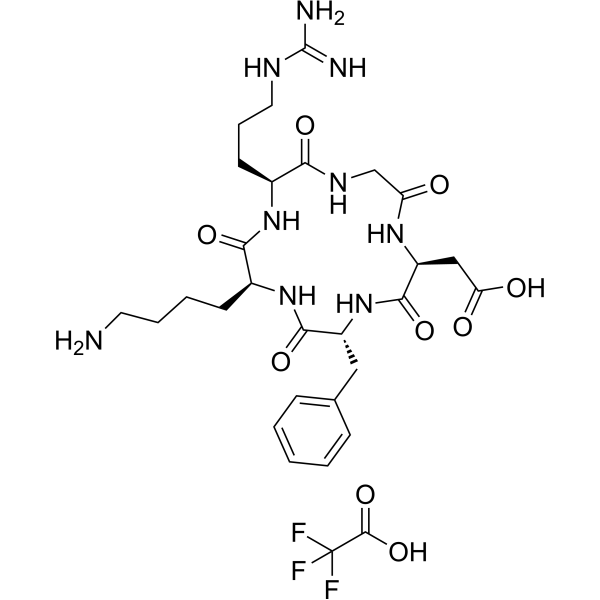
- HY-126810
-
|
|
Fungal
|
Infection
|
|
NP213 is a rapidly acting, novel, first-in-class synthetic antimicrobial peptide (AMP), has anti-fungal activities. NP213 targets the fungal cytoplasmic membrane and plays it role via membrane perturbation and disruption. NP213 is effective and well-tolerated in resolving nail fungal infections [2].
|
-
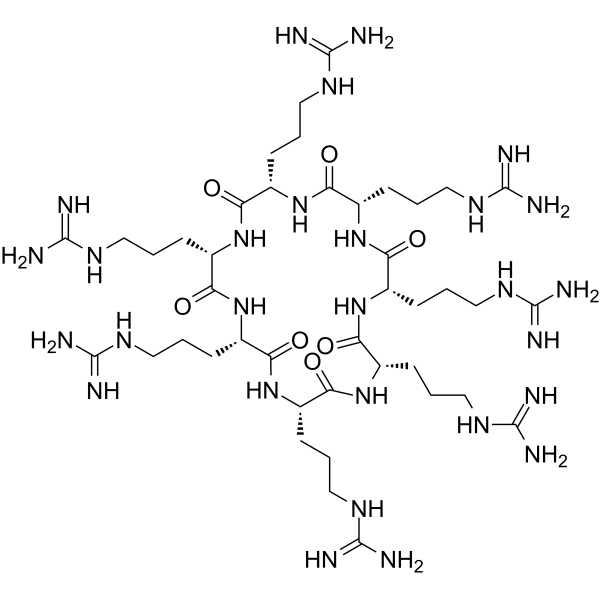
- HY-107245
-
-
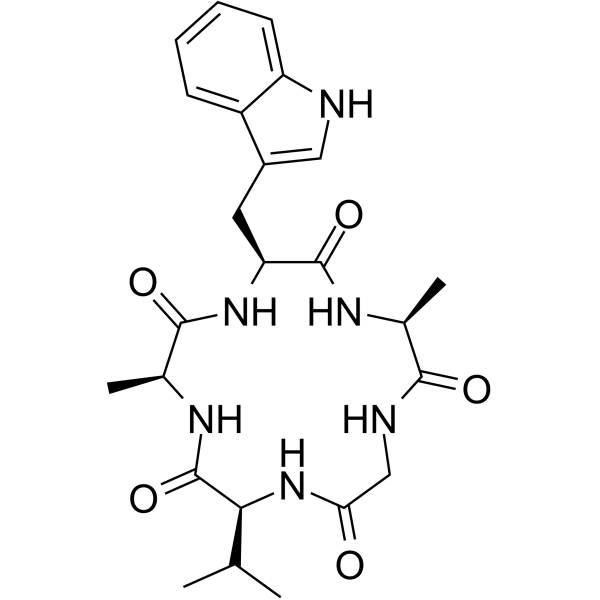
- HY-P1934A
-
|
|
Fungal
IFNAR
Reactive Oxygen Species
|
Infection
Inflammation/Immunology
Cancer
|
|
Cyclo(L-Phe-L-Pro), isolated from Pseudomonas fluorescens and Pseudomonas alcaligenes cell-free culture supernatants is an antifungal cyclic dipeptide . Cyclo(L-Phe-L-Pro) inhibits IFN-β production by interfering with retinoic-acid-inducible gene-I (RIG-I) activation [2]. Cyclo(L-Phe-L-Pro) exhibits free-radical scavenging activity with the IC50 of 24 µM in the DPPH assay .
|
-
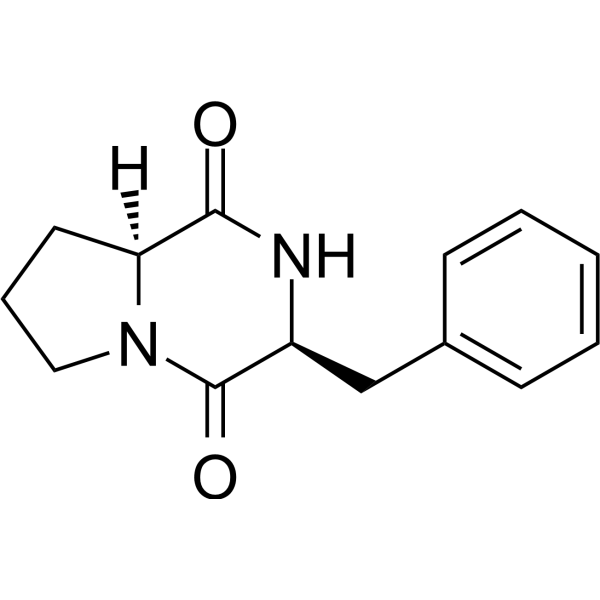
- HY-P2300
-
|
cyclo(RGDfC)
|
Integrin
|
Cancer
|
|
Cyclo(Arg-Gly-Asp-D-Phe-Cys) (Cyclo RGDfC), a cyclic RGD peptide which has high affinity to αvβ3, can disrupt cell integrin interactions. Cyclo(Arg-Gly-Asp-D-Phe-Cys) inhibits pluripotent marker expression in embryonic stem cells (ESCs) and the tumorigenic potential of mESCs in vivo. Cyclo(Arg-Gly-Asp-D-Phe-Cys) can be used in the research of tumors .
|
-
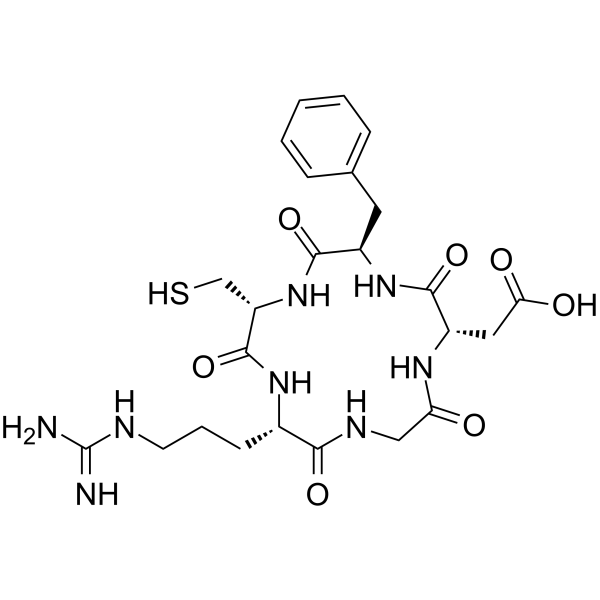
- HY-P1938
-
|
|
Bacterial
|
Infection
|
|
Cyclo(L-Pro-L-Val) is a 2,5-diketopiperazine, with toxic activity against phytopathogenic microorganisms (such as R. fascians LMG 3605). Cyclo(L-Pro-L-Val) shows toxicity similar to Chloramphenicol (HY-B0239) with comparable concentration. Cyclo(L-Pro-L-Val) can also inhibit gram-positive phytopathogenic bacterium. Cyclo(L-Pro-L-Val) has potential development as biopesticide .
|
-
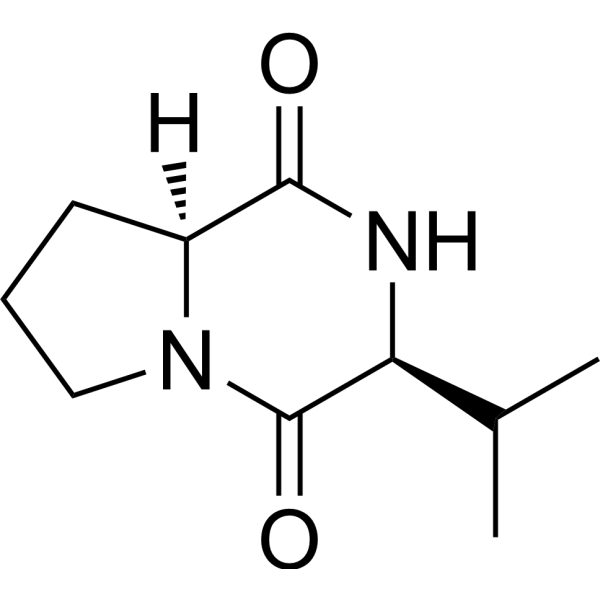
- HY-P5033
-
|
|
Bacterial
|
Cancer
|
Cyclo(Gly-His) is a liposome-encapsulated cyclic dipeptide with antimicrobial and anticancer activity. Cyclo(Gly-His) has cytotoxicity for HeLa and MCF-7 cell with IC50 values of 1.699 mM and 0.358 mM, respectively. Cyclo(Gly-His) can be used for the research of drug delivery systems .
|
-
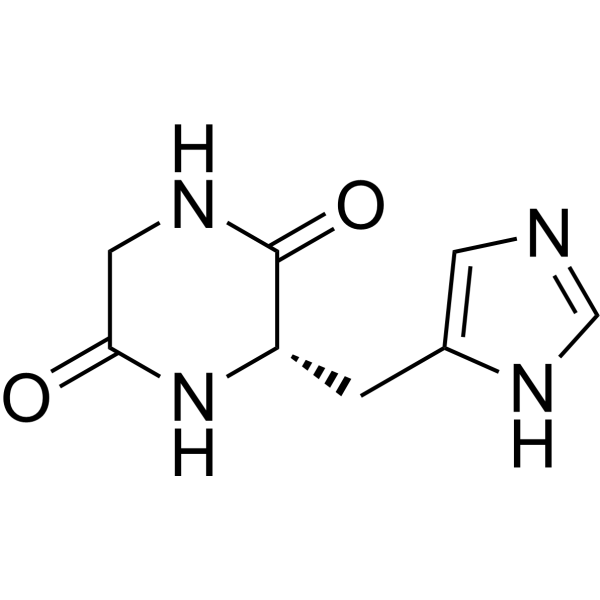
- HY-P5314
-
|
|
EGFR
STAT
|
Others
|
|
OK2, a specific inhibitor of the CCN2/EGFR interaction, efficiently blocks CCN2/EGFR interaction through binding to the CT domain of CCN2. OK2 can be used for kidney fibrosis and chronic kidney disease research .
|
-
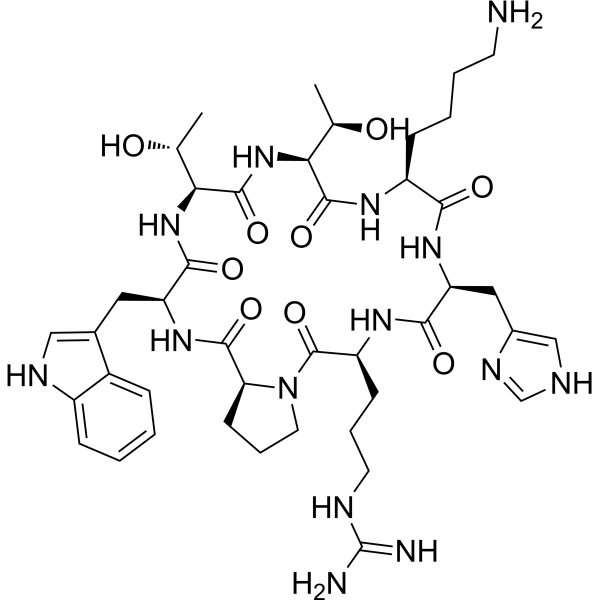
- HY-P1935
-
-
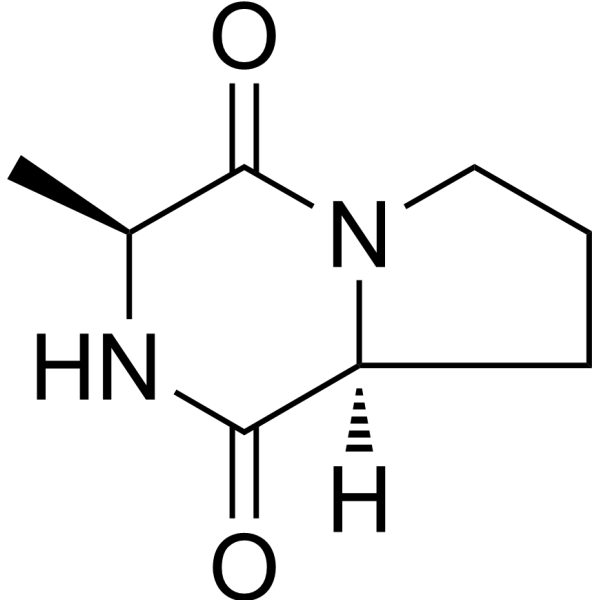
- HY-P5038
-
|
c(GRGDSP)
|
Integrin
|
Cancer
|
|
Cyclo(Gly-Arg-Gly-Asp-Ser-Pro) (c(GRGDSP)) is an RGD-containing inhibitory peptide. Cyclo(Gly-Arg-Gly-Asp-Ser-Pro) is a synthetic α5β1 integrin ligand that competitively inhibits the binding of invasin (Inv) to α5β1 integrin expressed on Caco-2 cells .
|
-
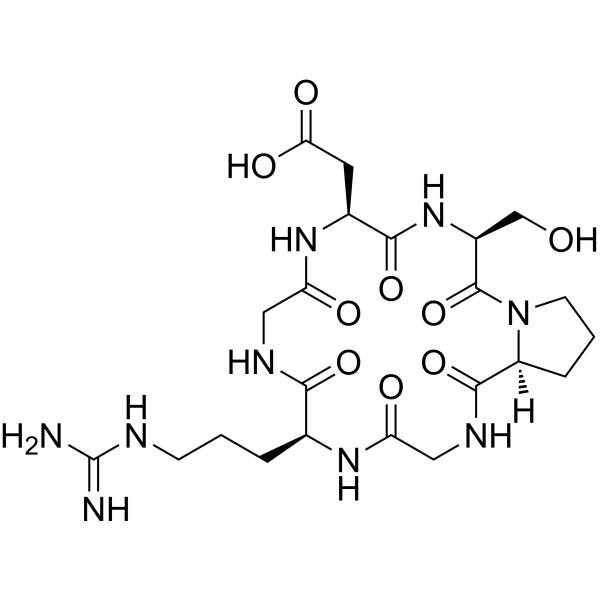
- HY-P5698
-
|
|
Bacterial
|
Infection
|
|
Cyclopetide 1 (Compound 1) is an antimicrobial peptide with moderate activity against B. subtilis, with a MIC of 25 μg/mL .
|
-
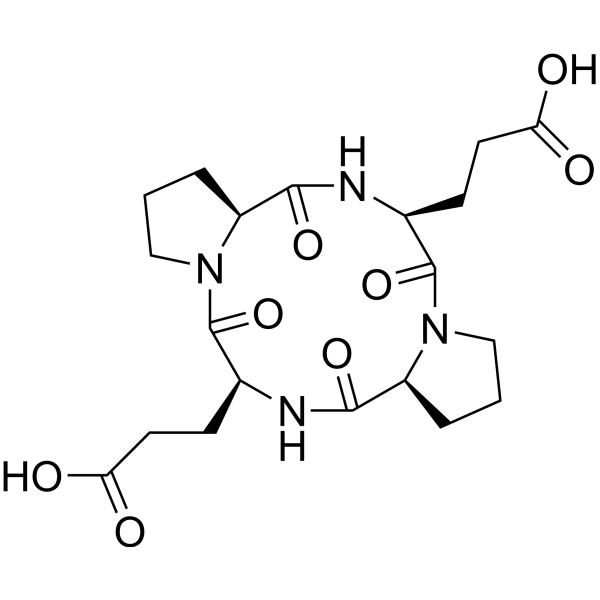
- HY-P5699
-
|
|
Bacterial
|
Infection
|
|
Cyclopetide 2 (Compound 2) is an antimicrobial peptide with moderate activity against B. subtilis, with a MIC of 50 μg/mL .
|
-
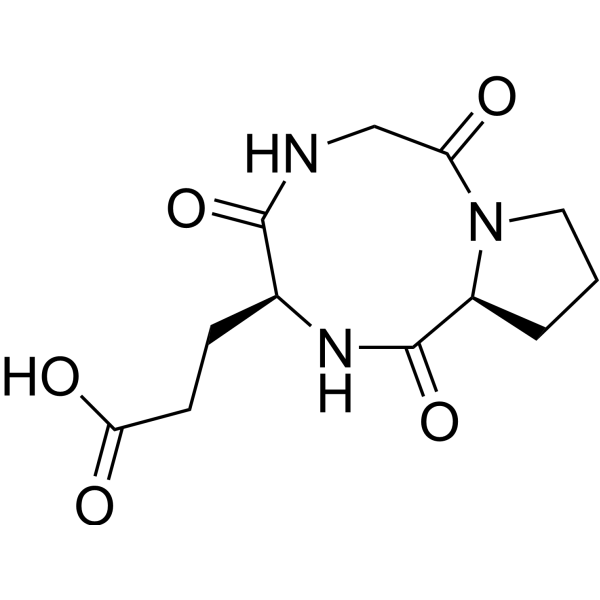
- HY-P10052
-
|
|
VEGFR
|
Cancer
|
|
CBO-P11 specifically binds to receptor of VEGFR-2 and is used as targeting ligand for tumor angiogenesis. CBO-P11 is modified with a nearinfrared cyanine dye bearing an alkyne function, allowing both “click” coupling on azido-modified nanoparticles and fluorescence labelling .
|
-
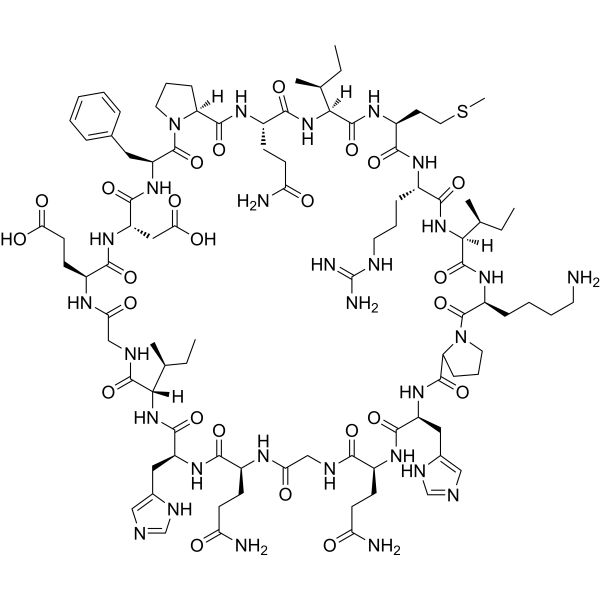
- HY-P10222
-
|
|
HIF/HIF Prolyl-Hydroxylase
|
Cancer
|
|
Cyclo CRLLIF is a dual inhibitor for hypoxia inducible factor (HIF) 1 and 2, which disrupts the interaction of both HIF1-α and HIF2-α with HIF1-β, with affinity for HIF1-α and HIF2-α PAS-B domains KD of 14.5 and 10.2 μM, respectively .
|
-
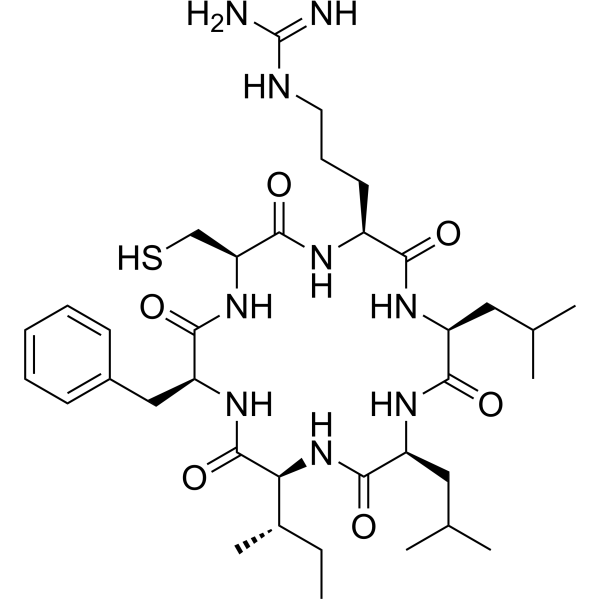
- HY-P10223
-
|
|
HIF/HIF Prolyl-Hydroxylase
|
Cancer
|
|
Cyclo CRVIIF is a dual inhibitor for hypoxia inducible factor (HIF) 1 and 2, which disrupts the interaction of both HIF1-α and HIF2-α with HIF1-β, with affinity for HIF1-α and HIF2-α PAS-B domains KD of 65 and 123 μM, respectively .
|
-
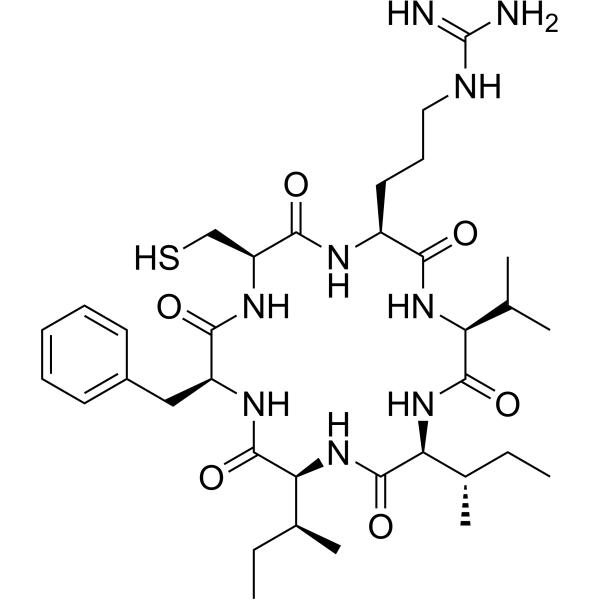
- HY-P10221
-
|
|
HIF/HIF Prolyl-Hydroxylase
|
Cancer
|
|
Cyclo CKLIIF is a dual inhibitor for hypoxia inducible factor (HIF) 1 and 2, which disrupts the interaction of both HIF1-α and HIF2-α with HIF1-β, with affinity for HIF1-α and HIF2-α PAS-B domains KD of 2.6 and 2.2 μM, respectively .
|
-
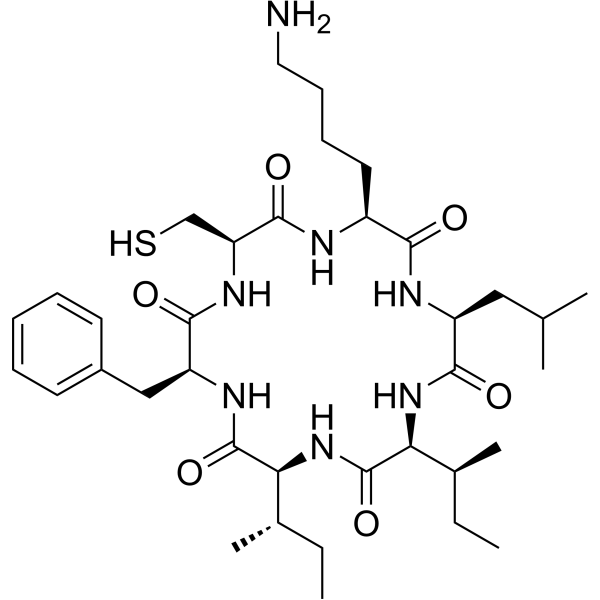
- HY-P4820A
-
|
|
Bacterial
|
Inflammation/Immunology
|
|
SYNV-cyclo(CGGYF) TFA is a Staphylococcus hominis (S. hominis) C5 autoinducing peptide. SYNV-cyclo(CGGYF) TFA inhibits S. aureus activity. SYNV-cyclo(CGGYF) TFA has the potential for the research of S. aureus-mediated epithelial damage and inflammation .
|
-
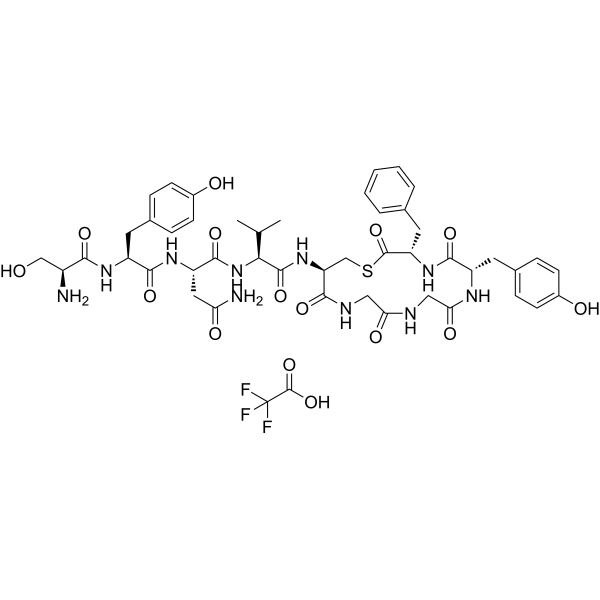
- HY-P4820
-
|
|
Bacterial
|
Inflammation/Immunology
|
|
SYNV-cyclo(CGGYF) is a Staphylococcus hominis (S. hominis) C5 autoinducing peptide. SYNV-cyclo(CGGYF) inhibits S. aureus activity. SYNV-cyclo(CGGYF) has the potential for the research of S. aureus-mediated epithelial damage and inflammation .
|
-
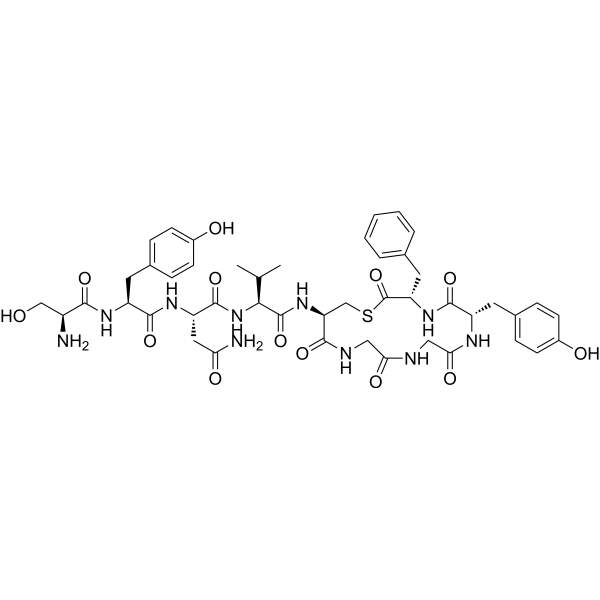
- HY-P3227
-
|
XJ735
|
Integrin
|
Inflammation/Immunology
|
|
Cyclo(Ala-Arg-Gly-Asp-Mamb) is a selective RGD peptide antagonist and has the potential for Pulmonary arterial hypertension
Research .
|
-
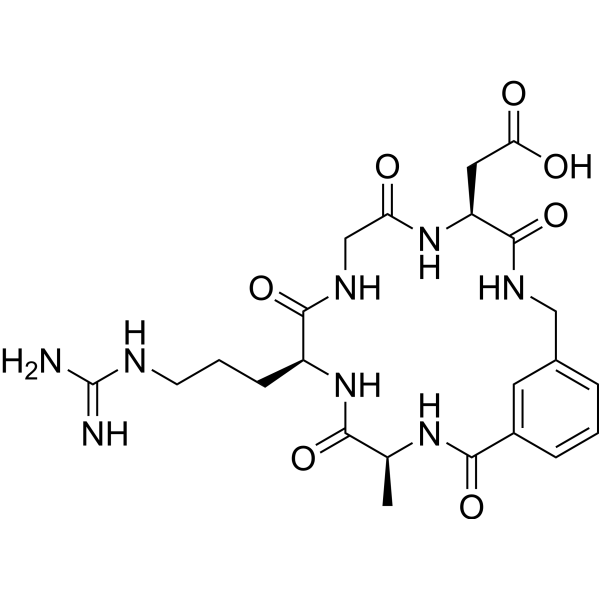
- HY-P5712
-
|
Gramicidin soviet
|
Antibiotic
Bacterial
|
Infection
|
|
Gramicidin S (Gramicidin soviet) is a cationic cyclic peptide antibiotic. Gramicidin S is active against Gram-negative and Gram-positive bacteria by perturbing integrity of the bacterial membranes. Gramicidin S also inhibits cytochrome bd quinol oxidase .
|
-
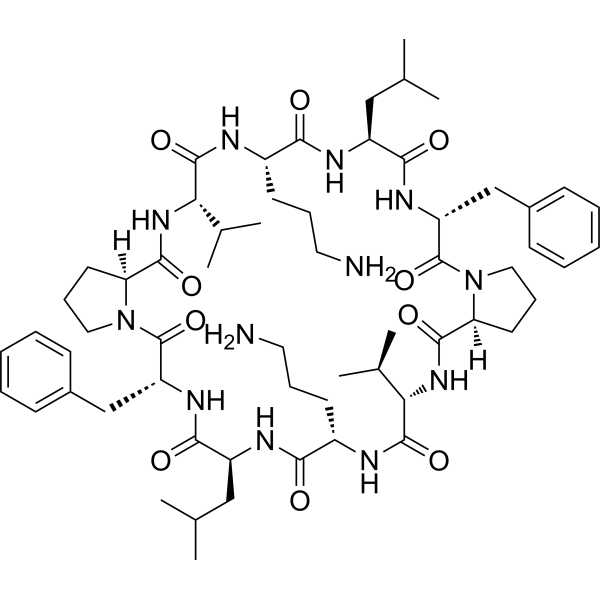
- HY-P1201
-
|
|
Somatostatin Receptor
|
Cancer
|
|
Cyclosomatostatin is a potent somatostatin (SST) receptor antagonist. Cyclosomatostatin can inhibit somatostatin receptor type 1 (SSTR1) signaling and decreases cell proliferation, ALDH+ cell population size and sphere-formation in colorectal cancer (CRC) cells .
|
-
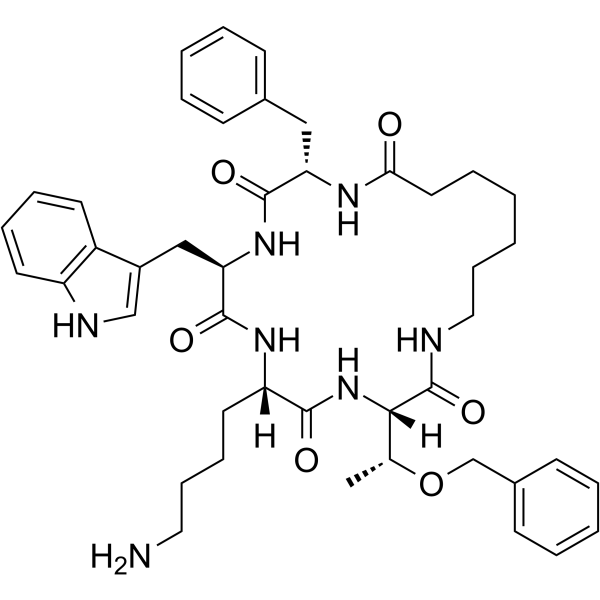
- HY-P1201A
-
|
|
Somatostatin Receptor
|
Cancer
|
|
Cyclosomatostatin TFA is a potent somatostatin (SST) receptor antagonist. Cyclosomatostatin TFA can inhibit somatostatin receptor type 1 (SSTR1) signaling and decreases cell proliferation, ALDH+ cell population size and sphere-formation in colorectal cancer (CRC) cells .
|
-
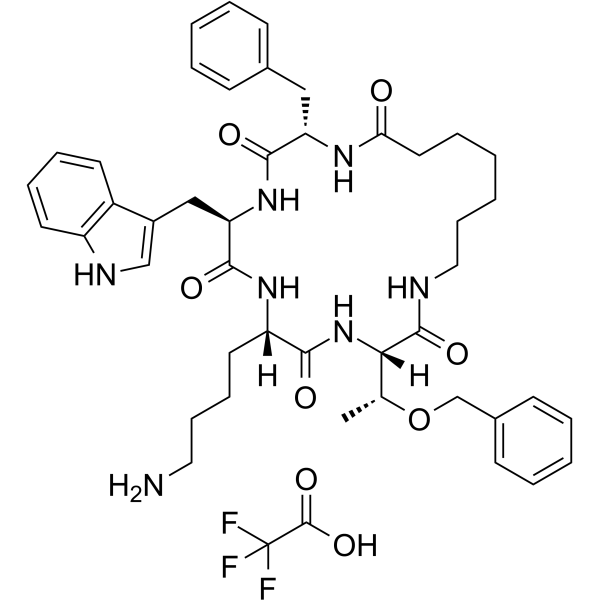
- HY-149205
-
|
|
PI3K
ERK
|
Inflammation/Immunology
|
|
CXJ-2 is a cyclic peptide, and exhibits moderate affinity toward elastin derived peptides (EDPs). CXJ-2 exhibits potent activities to inhibit the PI3K/ERK pathway and decrease hepatic stellate cell proliferation and migration. CXJ-2 possesses potent antifibrotic efficacy .
|
-
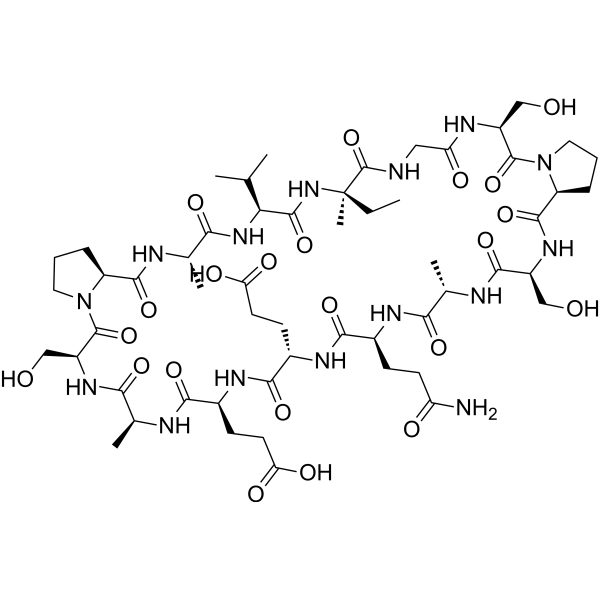
- HY-P5840
-
|
|
Biochemical Assay Reagents
|
Cancer
|
|
Cyclo(RGDyC) is a cyclic pentapeptide with anti-angiogenic abilities. Cyclo(RGDyC) can be combined with liposome delivery systems for research on ocular neovascular diseases and cancer [2].
|
-
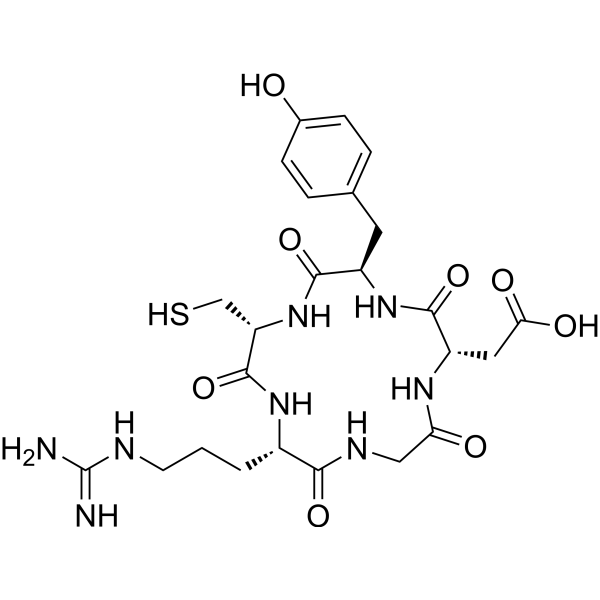
- HY-P1613A
-
|
cyclo(RGDfV) TFA; C(RGDfV) TFA
|
Integrin
Apoptosis
|
Cancer
|
|
Cyclo(Arg-Gly-Asp-D-Phe-Val) (TFA) (Cyclo(RGDfV) (TFA))is an integrin αvβ3 inhibitor. Cyclo(Arg-Gly-Asp-D-Phe-Val) (TFA) has antitumor activity. Cyclo(Arg-Gly-Asp-D-Phe-Val) (TFA) can be used for the research of acute myeloid leukemia .
|
-
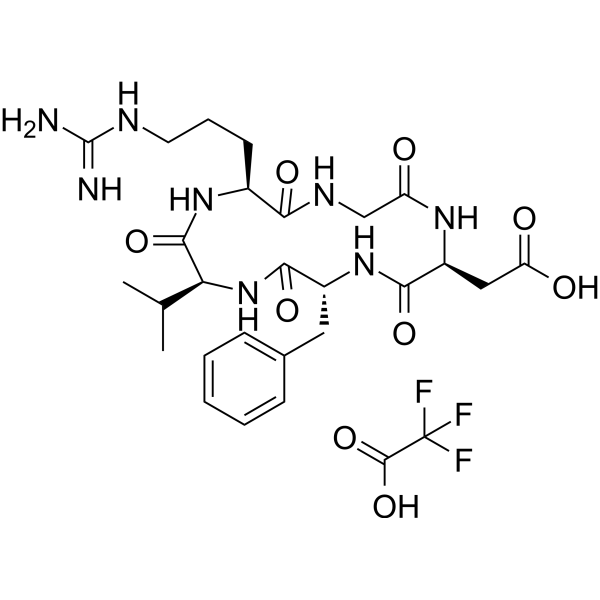
- HY-P1613
-
|
cyclo(RGDfV); C(RGDfV)
|
Integrin
Apoptosis
|
Cancer
|
|
Cyclo(Arg-Gly-Asp-D-Phe-Val) (Cyclo(RGDfV)) is an integrin αvβ3 inhibitor. Cyclo(Arg-Gly-Asp-D-Phe-Val) has antitumor activity. Cyclo(Arg-Gly-Asp-D-Phe-Val) can be used for the research of acute myeloid leukemia .
|
-
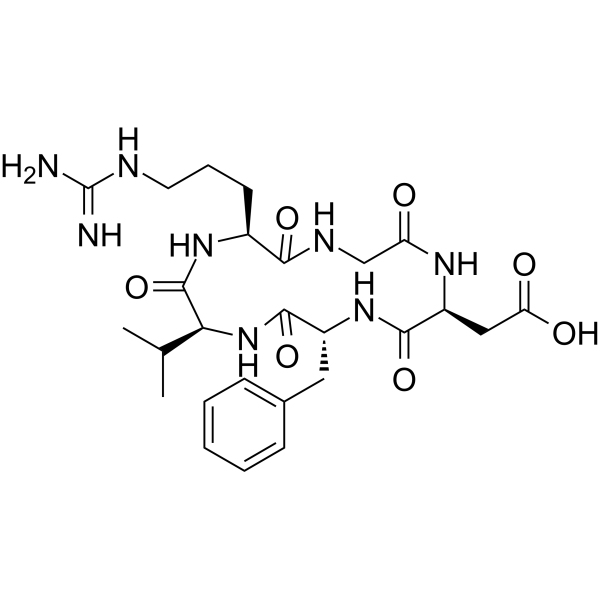
- HY-P3557
-
-
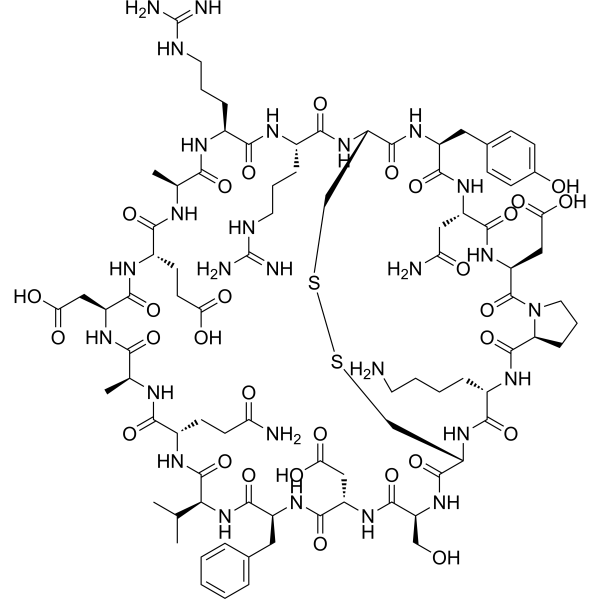
- HY-P1676
-
|
BK-1361
|
MMP
|
Cancer
|
|
cyclo(RLsKDK) (BK-1361) is a specific inhibitor of metalloproteinase ADAM8 with an IC50 value of 182 nM. cyclo(RLsKDK) has potential applications in inflammatory diseases and cancer .
|
-
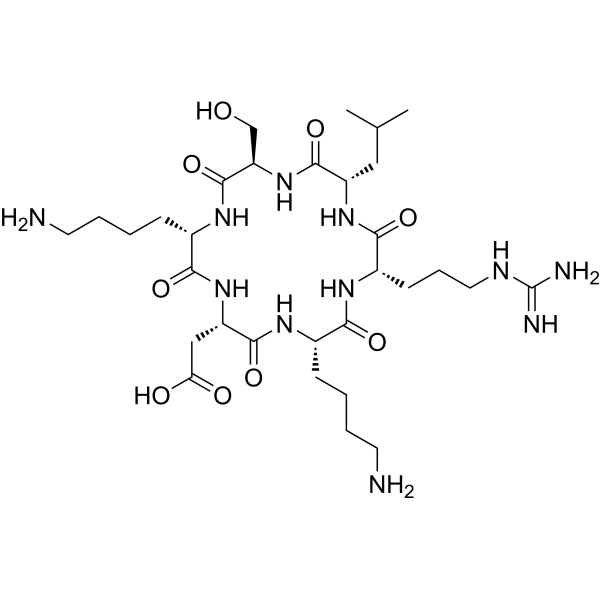
- HY-P1676A
-
|
BK-1361 TFA
|
MMP
|
Cancer
|
|
cyclo(RLsKDK) (TFA) (BK-1361 (TFA)) is a specific inhibitor of metalloproteinase ADAM8 with an IC50 value of 182 nM. cyclo(RLsKDK) (TFA) has potential applications in inflammatory diseases and cancer .
|
-
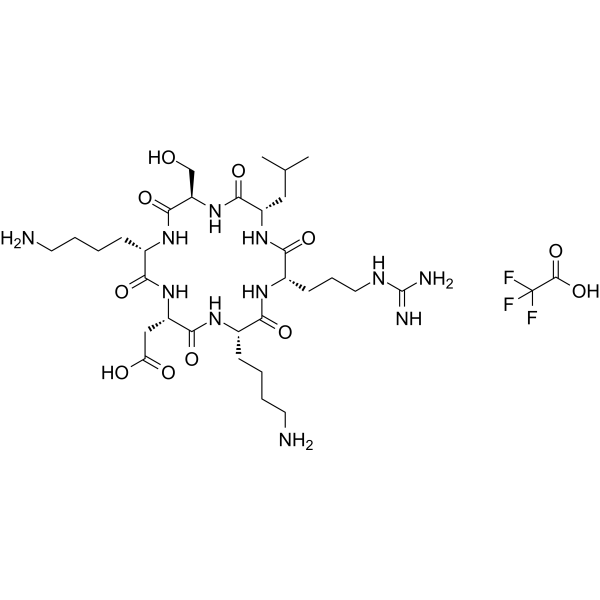
- HY-P5021
-
|
c(RGDfE)
|
Biochemical Assay Reagents
|
Cancer
|
|
Cyclo(Arg-Gly-Asp-(D-Phe)-Glu) (c(RGDfE)) is a cyclic RGD peptide that serves as a conjugated multifunctional nanodrug delivery system to target Gemcitabine to pancreatic cancer cells. Cyclo(Arg-Gly-Asp-(D-Phe)-Glu) can be used in cancer research .
|
-
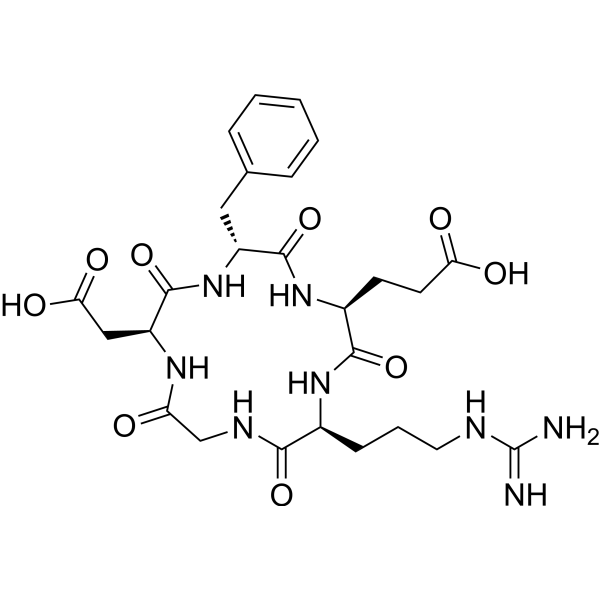
- HY-P5023
-
-
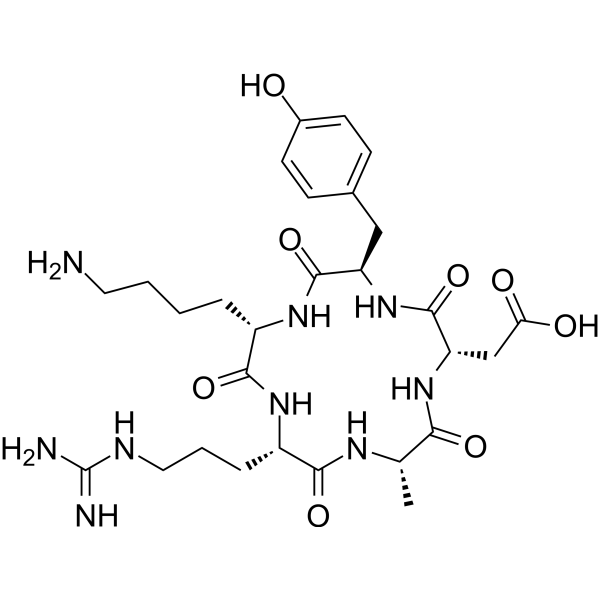
- HY-P3557A
-
-
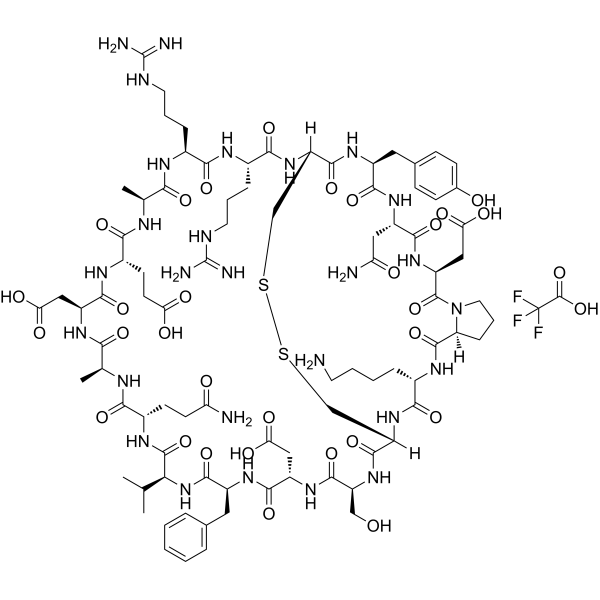
- HY-P5023A
-
-
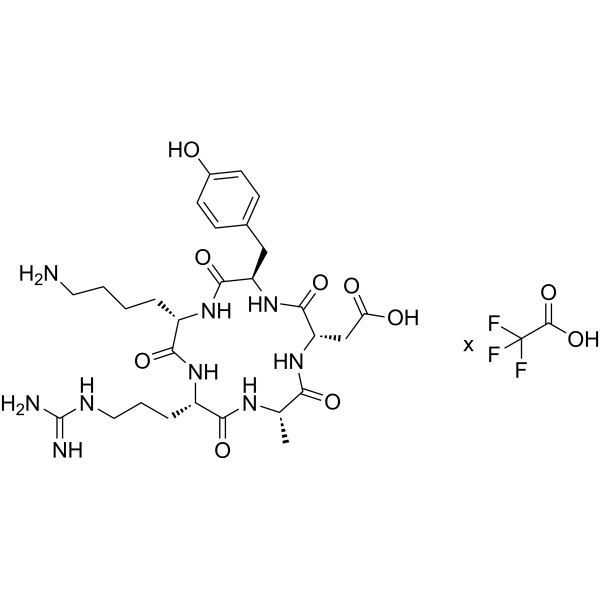
- HY-P5907
-
|
|
Opioid Receptor
|
Neurological Disease
|
|
Helianorphin-19 is a potent and selective κ-opioid receptor (KOR) activator with a Ki of 21 nM and an EC50 of 45 nM. Helianorphin-19 exhibits strong KOR-specific peripheral analgesic activity in a mouse model of chronic visceral pain .
|
-
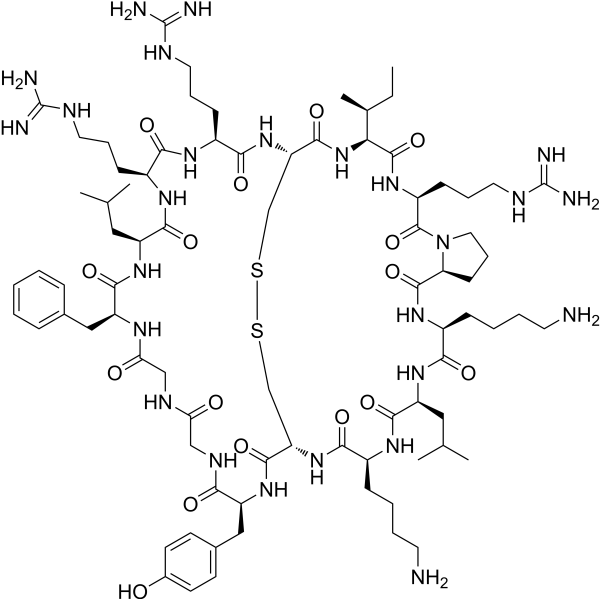
- HY-P10051
-
|
|
Ras
Raf
|
Cancer
|
|
Cyclorasin 9A5 is an 11-residue cell-permeable cyclic peptide that orthosterically inhibits the Ras-Raf protein interaction with an IC50 of 120 nM .
|
-
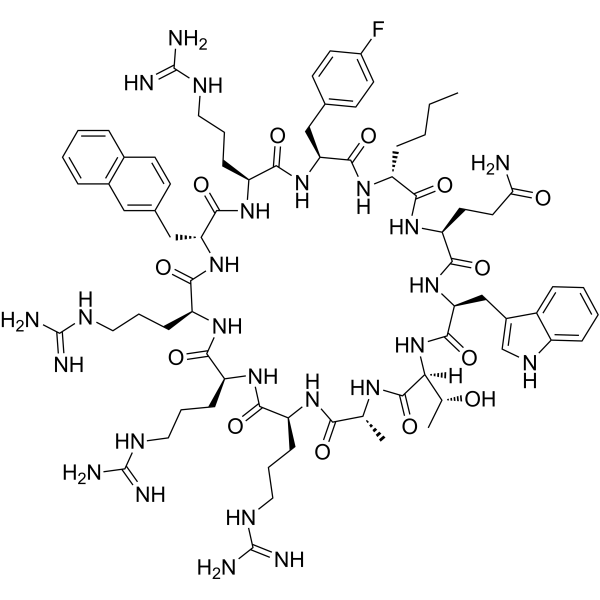
- HY-12378
-
BQ-123
2 Publications Verification
|
Endothelin Receptor
|
Cardiovascular Disease
|
|
BQ-123 is a potent and selective endothelin A (ETA) receptor antagonist with an IC50 of 7.3 nM and a Ki of 25 nM. BQ-123 inhibits endothelin-1-mediated proliferation of human pulmonary artery smooth muscle cells and lowers blood pressure in different rat models of hypertension [2] .
|
-
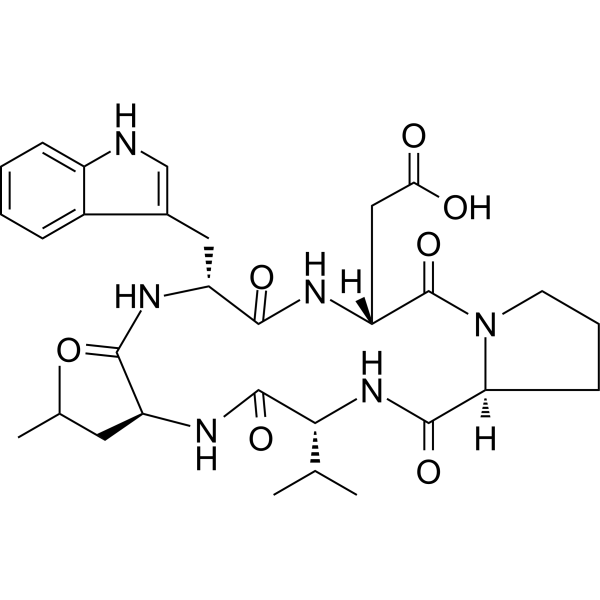
- HY-W019721
-
|
|
Nuclear Factor of activated T Cells (NFAT)
|
Inflammation/Immunology
|
|
Cyclosporin D, a metabolite of Cyclosporin A, is a weak immunosuppressant. Cyclosporin D is used as internal standard for quantification of Cyclosporin A [2]. Cyclosporin A is a potent immunosuppressant agent, suppress T cell activation by inhibiting calcineurin and the calcineurin-dependent transcription factors nuclear factor of activated T cells (NFAc) .
|
-
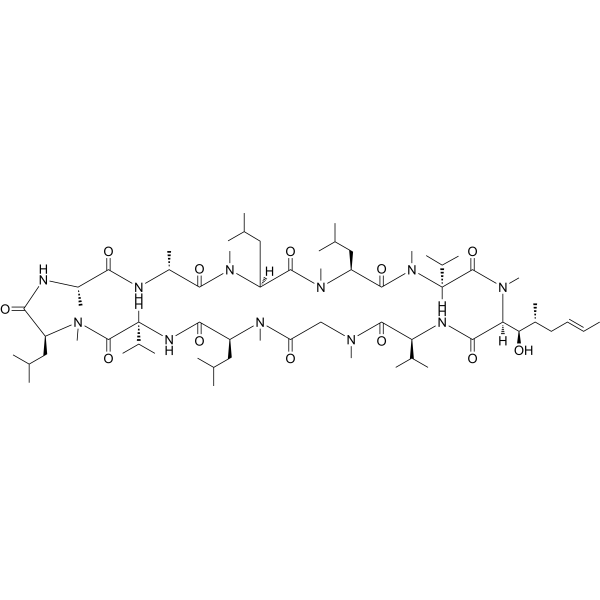
- HY-P5287
-
|
|
Integrin
|
Cancer
|
|
cRGDfK-thioacetyl ester is a bioactive polypeptide molecule. cRGDfK peptide has a selective affinity for integrins. cRGDfK peptide can modify NIR fluorescent probes for cancer targeting imaging [2].
|
-
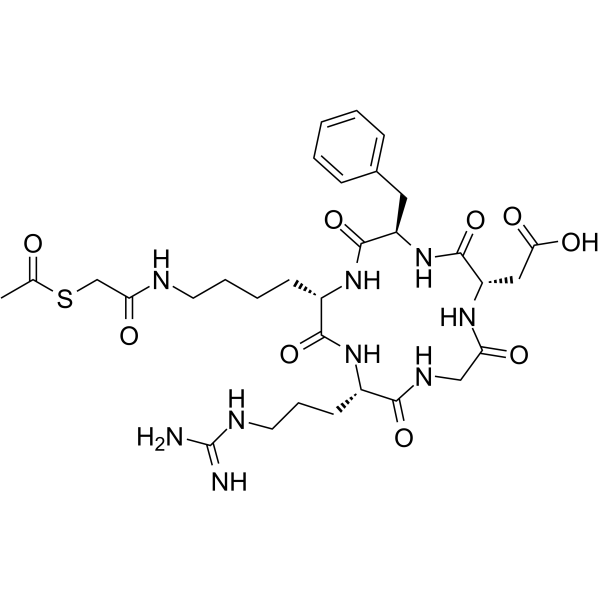
- HY-P5643
-
|
|
Bacterial
|
Infection
|
|
Retrocyclin-2 is an antimicrobial peptide against human immunodeficiency virus, influenza A and herpes simplex virus .
|
-
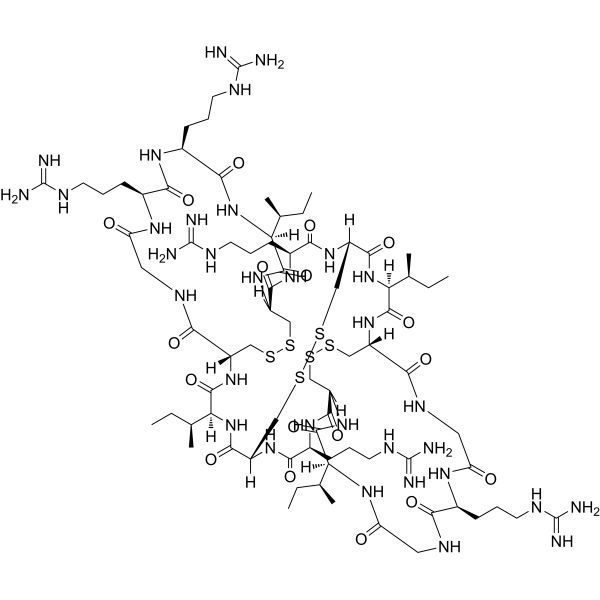
- HY-P5644
-
|
|
Bacterial
|
Infection
|
|
Retrocyclin-3 is an antimicrobial peptide against human immunodeficiency virus, influenza A and herpes simplex virus .
|
-
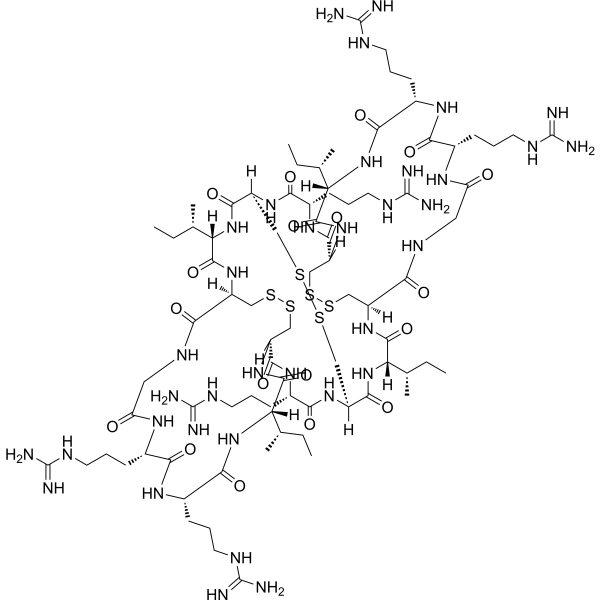
- HY-P5053
-
|
|
Integrin
|
Cancer
|
|
Galacto-RGD is an RGD analogue that can be coupled with the radioactive isotope 18F and used as an integrin α₅β₃ selective tracer .
|
-
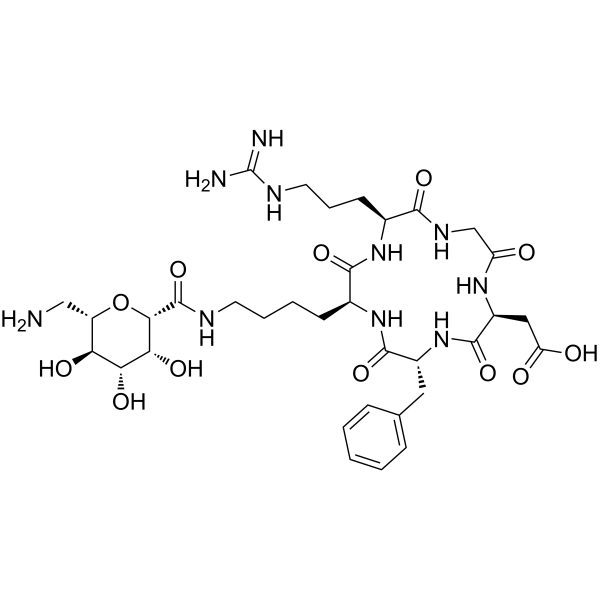
- HY-P5287A
-
|
|
Integrin
|
Cancer
|
|
cRGDfK-thioacetyl ester TFA is a bioactive polypeptide molecule. cRGDfK peptide has a selective affinity for integrins. cRGDfK peptide can modify NIR fluorescent probes for cancer targeting imaging [2].
|
-
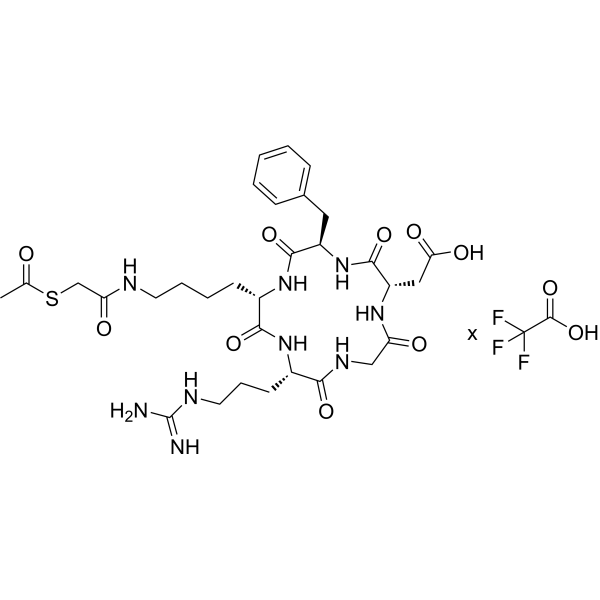
- HY-P5753A
-
|
|
Bacterial
|
Infection
|
|
JB-95 acetate, a β-hairpin macrocyclic peptide, exhibits potent antimicrobial activity against Escherichia coli. JB-95 acetate can selectively disrupt the outer membrane but not the inner membrane of E. coli .
|
-
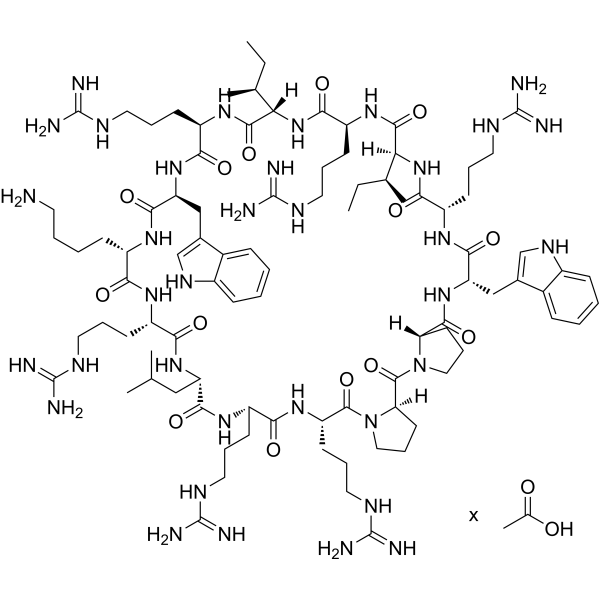
- HY-P4992
-
|
|
Somatostatin Receptor
|
Cancer
|
|
Tyr-(D-Dab4,Arg5,D-Trp8)-cyclo-Somatostatin-14 (4-11) is a somatostatin agonist that can be used in cancer research .
|
-
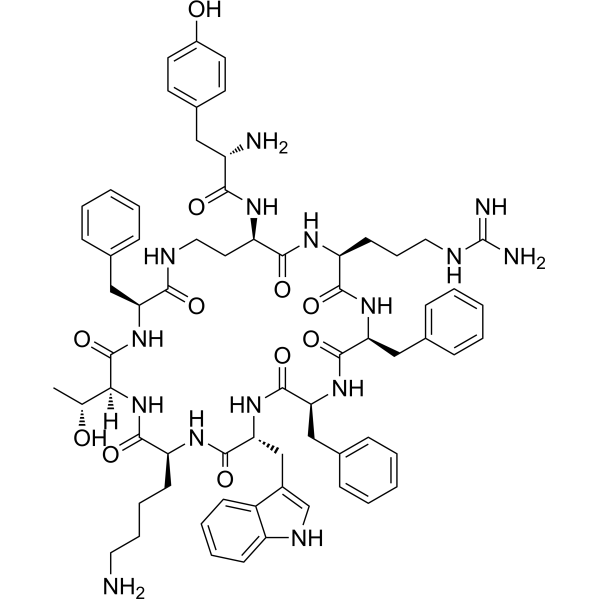
- HY-P5738
-
|
|
Bacterial
|
Infection
|
|
Palicourein is a 37 amino acid cyclic polypeptide. Palicourein inhibits the in vitro cytopathic effects of HIV-1RF infection of CEM-SS cells with an EC50 value of 0.1 μM and an IC50 value of 1.5 μM .
|
-

- HY-P5739
-
|
|
Bacterial
|
Infection
|
|
Mram 8 is a cyclotide isolated from Viola philippica, a plant from the Violaceae family .
|
-
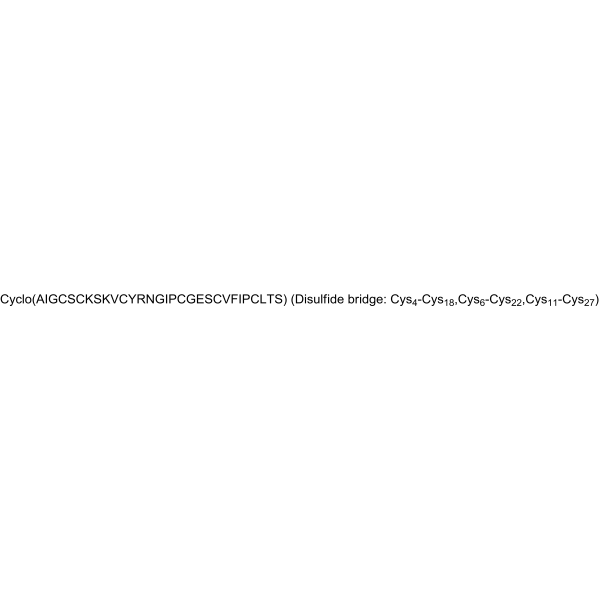
- HY-P5753
-
|
|
Bacterial
|
Infection
|
|
JB-95, a β-hairpin macrocyclic peptide, exhibits potent antimicrobial activity against Escherichia coli. JB-95 can selectively disrupt the outer membrane but not the inner membrane of E. coli .
|
-
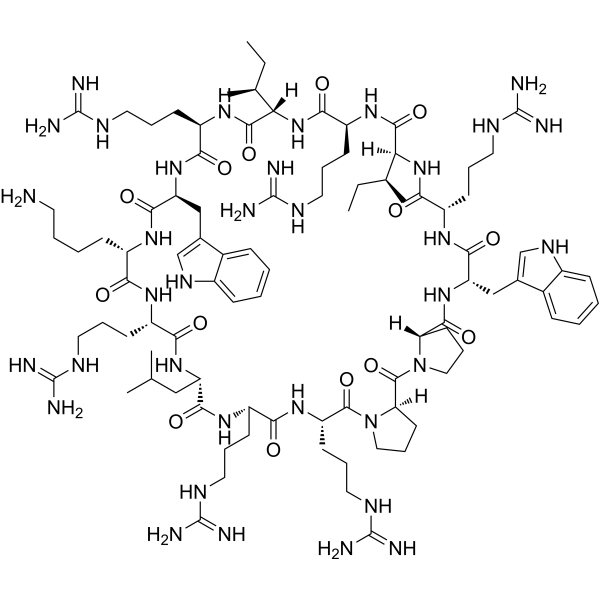
- HY-P10200
-
|
|
Bacterial
|
Infection
|
|
CP7-FP13-2 is a peptide with antivirulence factor and antibacterial activity. CP7-FP13-2 inhibits the formation of Staphylococcus aureus biofilm and has good antibacterial efficacy in mice .
|
-

- HY-106103
-
-

- HY-P4201
-
|
|
Vasopressin Receptor
|
Cardiovascular Disease
|
|
JKC 301 is a selective Endothelin A receptor antagonist. JKC 301 attenuates the pressor effects of nicotine in rats. JKC 301 can be used to study cardiovascular disease caused by smoking [2].
|
-
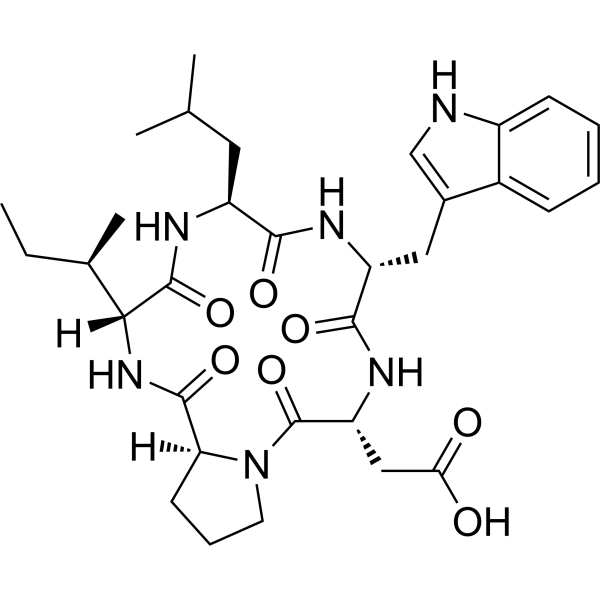
- HY-120301
-
-
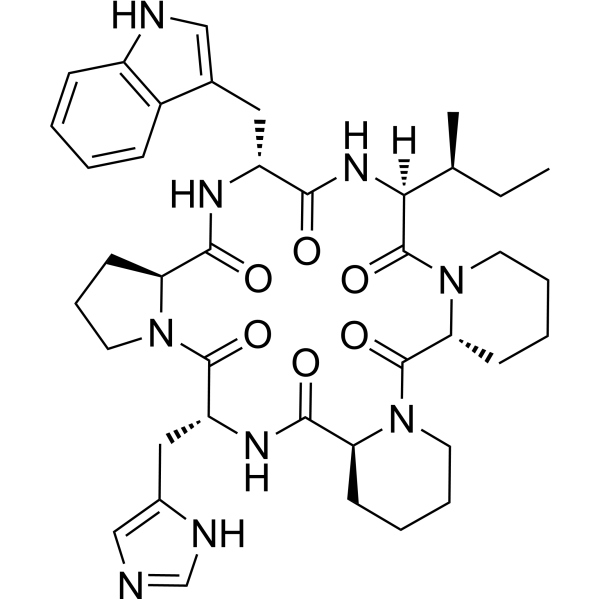
- HY-P4910
-
|
|
Proteasome
Apoptosis
|
Cancer
|
|
Baceridin is a proteasome inhibitor and a cyclic hexapeptide. Baceridin can be isolated from the culture medium of Epiphytic Bacillus. Baceridin can inhibit cell cycle progression and induce tumor cell apoptosis through a p53-independent pathway. Baceridin can be used in cancer research .
|
-
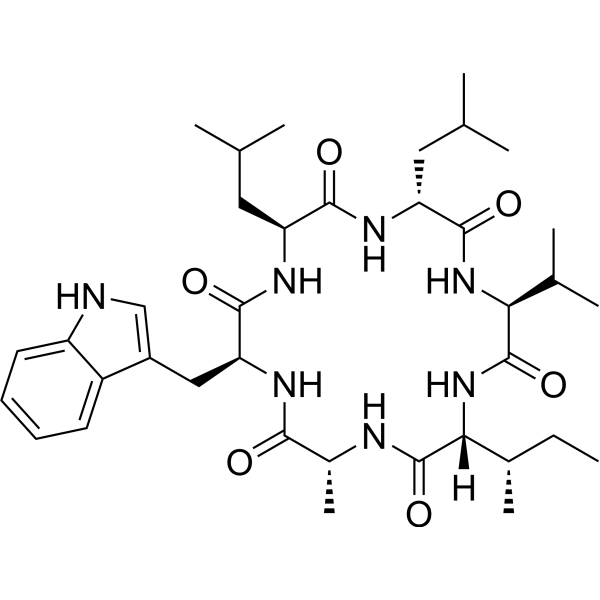
- HY-P10203
-
|
|
Opioid Receptor
|
Inflammation/Immunology
|
|
μ/κ/δ opioid receptor agonist 1 is a μ opioid receptor (MOR), κ opioid receptor (KOR), and δ opioid receptor (DOR) agonist. μ/κ/δ opioid receptor agonist 1 produces a strong and long-lasting analgesic effect through peripheral MOR and KOR in the tail-flick test .
|
-
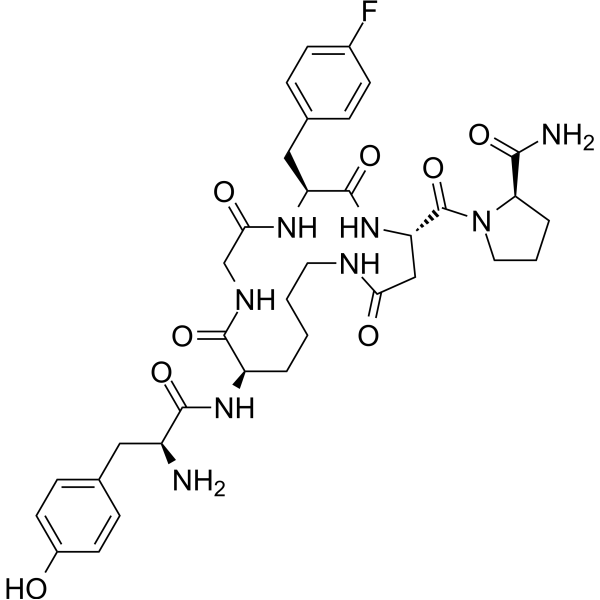
- HY-P1674A
-
|
POL7080 TFA
|
Bacterial
Antibiotic
|
Infection
|
|
Murepavadin (POL7080) (TFA), a 14-amino-acid cyclic peptide, is a highly potent, specific antibiotic. Murepavadin exhibits a potent antimicrobial activity for P. aeruginosa with MIC50 and MIC90 values both of 0.12 mg/L. Murepavadin also can target the lipopolysaccharide transport portin D. Murepavadin can be used for the research of bacterial resistance [2].
|
-
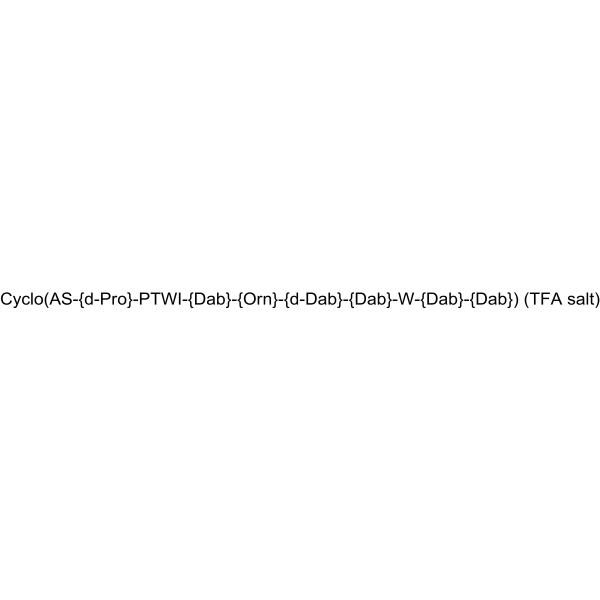
- HY-P1682A
-
|
POL6326 TFA
|
CXCR
Arrestin
|
Cancer
|
|
Balixafortide TFA (POL6326 TFA) is a potent, selective, well-tolerated peptidic CXCR4 antagonist with an IC50 < 10 nM. Balixafortide TFA shows 1000-fold selective for CXCR4 than a large panel of receptors including CXCR7. Balixafortide TFA blocks β-arrestin recruitment and calcium flux with IC50s < 10 nM. Balixafortide TFA is also a potent hematopoietic stem and progenitor cell (HSPC) mobilizing agent. Anti-cancer effects [2].
|
-

- HY-P1682
-
|
POL6326
|
CXCR
Arrestin
|
Cancer
|
|
Balixafortide (POL6326) is a potent, selective, well-tolerated peptidic CXCR4 antagonist with an IC50 < 10 nM. Balixafortide shows 1000-fold selective for CXCR4 than a large panel of receptors including CXCR7. Balixafortide blocks β-arrestin recruitment and calcium flux with IC50s < 10 nM. Balixafortide is also a potent hematopoietic stem and progenitor cell (HSPC) mobilizing agent. Anti-cancer effects [2].
|
-
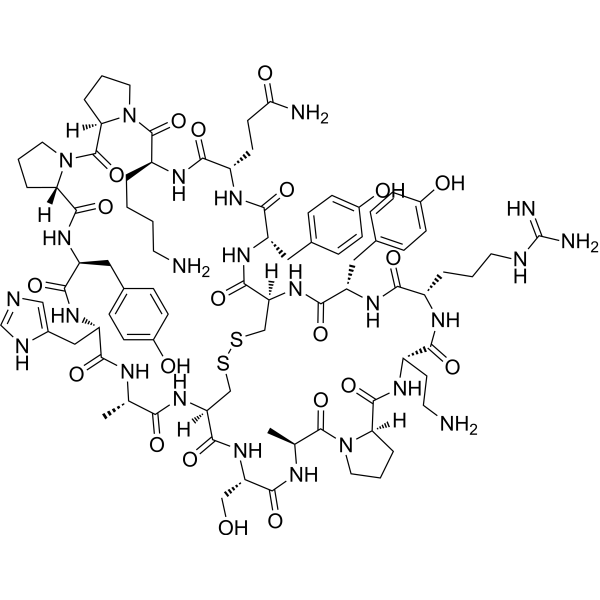
- HY-P1674
-
|
POL7080
|
Bacterial
Antibiotic
|
Infection
|
|
Murepavadin (POL7080), a 14-amino-acid cyclic peptide, is a highly potent, specific antibiotic. Murepavadin exhibits a potent antimicrobial activity for P. aeruginosa with both MIC50 and MIC90 values of 0.12 mg/L. Murepavadin also can target the lipopolysaccharide transport portin D. Murepavadin can be used for the research of bacterial resistance [2].
|
-
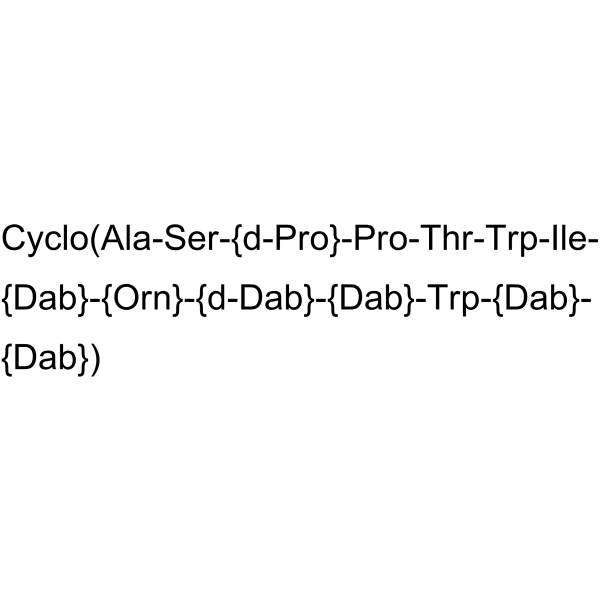
- HY-105168
-
|
|
Endothelin Receptor
|
Cardiovascular Disease
|
|
TAK 044 is an antagonist of Endothelin Receptor. TAK 044 strongly inhibits ET-induced deterioration in various animal models. TAK 044 can be used in study ET-related diseases such as acute myocardial infarction,acute renal failure, acute hepatic malfunction, and subarachnoid hemorrhage .
|
-
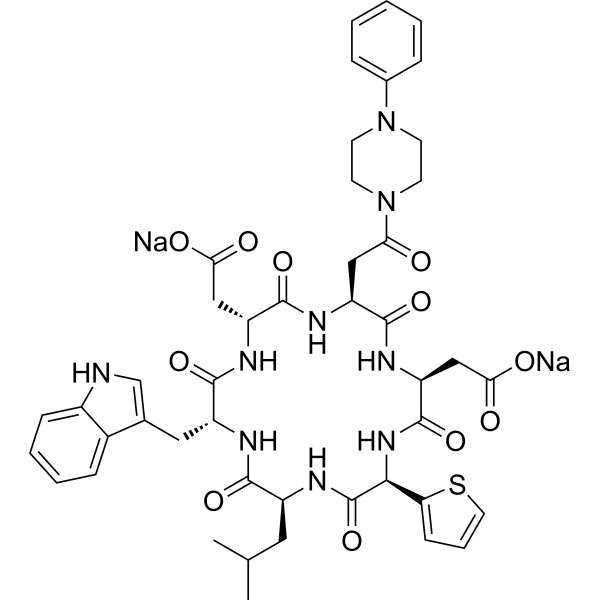
- HY-P5957
-
|
|
Parasite
|
Infection
|
|
Omphalotin A is a cyclic peptide, and shows nematicidal activity .
|
-
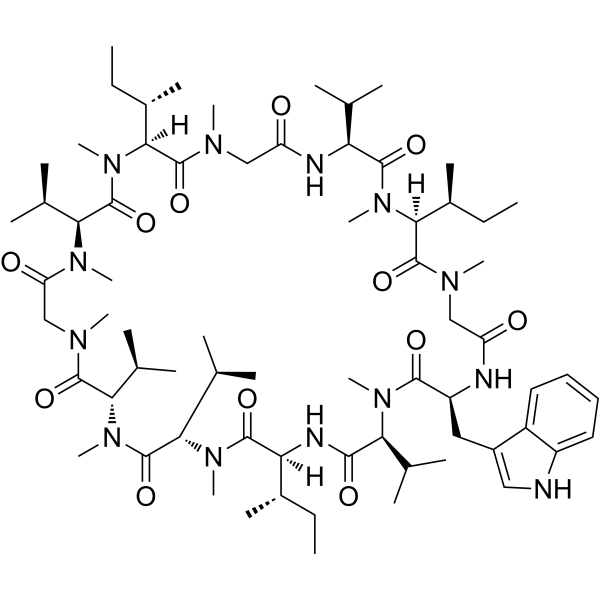
- HY-P3440
-
|
|
PD-1/PD-L1
|
Cancer
|
|
WL12 is a specifically targeting programmed death ligand 1 (PD-L1) binding peptide. WL12 can be radiolabeled by different radionuclides, generating radiotracers, which can assess the tumor PD-L1 expression .
|
-
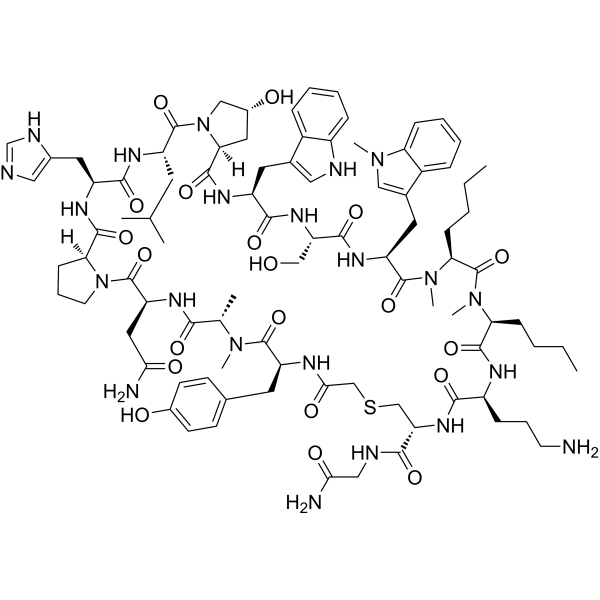
| Cat. No. |
Product Name |
Target |
Research Area |
-
- HY-P0031
-
|
|
Integrin
|
Others
|
|
Cyclo(RADfK) is a selective α(v)β(3) integrin ligand that has been extensively used for research, therapy, and diagnosis of neoangiogenesis.
|
-
- HY-P0023
-
Cyclo(-RGDfK)
Maximum Cited Publications
10 Publications Verification
|
Integrin
|
Cancer
|
|
Cyclo(-RGDfK) is a potent and selective inhibitor of the αvβ3 integrin, with an IC50 of 0.94 nM . Cyclo(-RGDfK) TFA potently targets tumor microvasculature and cancer cells through the specific binding to the αvβ3 integrin on the cell surface [2].
|
-
- HY-P0231
-
-
- HY-P1934
-
|
cyclo(phenylalanylprolyl); A-64863
|
HCV
|
Infection
|
|
Cyclo(Phe-Pro) (Cyclo(phenylalanylprolyl)), a Vibrio vulnificus quorum-sensing molecule, inhibits retinoic acid-inducible gene-I (RIG-I) polyubiquitination, through its specific interaction with RIG-I, to blunt IRF-3 activation and type-I IFN production. Cyclo(Phe-Pro) (Cyclo(phenylalanylprolyl)) enhances susceptibility to hepatitis C virus (HCV), as well as Sendai and influenza viruses .
|
-
- HY-126810A
-
|
|
Fungal
|
Infection
|
|
NP213 TFA is a rapidly acting, novel, first-in-class synthetic antimicrobial peptide (AMP), has anti-fungal activities. NP213 TFA targets the fungal cytoplasmic membrane and plays it role via membrane perturbation and disruption. NP213 TFA is effective and well-tolerated in resolving nail fungal infections [2].
|
-
- HY-P0023A
-
|
|
Integrin
|
Cancer
|
|
Cyclo(-RGDfK) TFA is a potent and selective inhibitor of the αvβ3 integrin, with an IC50 of 0.94 nM . Cyclo(-RGDfK) TFA potently targets tumor microvasculature and cancer cells through the specific binding to the αvβ3 integrin on the cell surface .
|
-
- HY-107245
-
-
- HY-P1934A
-
|
|
Fungal
IFNAR
Reactive Oxygen Species
|
Infection
Inflammation/Immunology
Cancer
|
|
Cyclo(L-Phe-L-Pro), isolated from Pseudomonas fluorescens and Pseudomonas alcaligenes cell-free culture supernatants is an antifungal cyclic dipeptide . Cyclo(L-Phe-L-Pro) inhibits IFN-β production by interfering with retinoic-acid-inducible gene-I (RIG-I) activation [2]. Cyclo(L-Phe-L-Pro) exhibits free-radical scavenging activity with the IC50 of 24 µM in the DPPH assay .
|
-
- HY-P2300
-
|
cyclo(RGDfC)
|
Integrin
|
Cancer
|
|
Cyclo(Arg-Gly-Asp-D-Phe-Cys) (Cyclo RGDfC), a cyclic RGD peptide which has high affinity to αvβ3, can disrupt cell integrin interactions. Cyclo(Arg-Gly-Asp-D-Phe-Cys) inhibits pluripotent marker expression in embryonic stem cells (ESCs) and the tumorigenic potential of mESCs in vivo. Cyclo(Arg-Gly-Asp-D-Phe-Cys) can be used in the research of tumors .
|
-
- HY-P4705
-
|
|
Peptides
|
Inflammation/Immunology
|
|
Hymenistatin I is a cyclic octapeptide [c-(-Pro-Pro-Tyr-Val-Pro-Leu-Ile-ile-Ile-)] with immunosuppressive activity in both humoral and cellular immune responses .
|
-
- HY-W549438
-
|
|
Peptides
|
Others
|
|
Cyclo(Phe-Phe) is a polypeptide that can be found by peptide screening. Peptide screening is a research tool that pools active peptides primarily by immunoassay. Peptide screening can be used for protein interaction, functional analysis, epitope screening, especially in the field of agent research and development .
|
-
- HY-P5050
-
|
|
Peptides
|
Others
|
|
Cyclo(Pro-Thr) is a polypeptide that can be found by peptide screening. Peptide screening is a research tool that pools active peptides primarily by immunoassay. Peptide screening can be used for protein interaction, functional analysis, epitope screening, especially in the field of agent research and development .
|
-
- HY-P5030
-
|
|
Peptides
|
Others
|
|
Cyclo(Met-Met) is a polypeptide that can be found by peptide screening. Peptide screening is a research tool that pools active peptides primarily by immunoassay. Peptide screening can be used for protein interaction, functional analysis, epitope screening, especially in the field of agent research and development .
|
-
- HY-P5051
-
|
|
Peptides
|
Others
|
|
Isorugulosuvine is a polypeptide that can be found by peptide screening. Peptide screening is a research tool that pools active peptides primarily by immunoassay. Peptide screening can be used for protein interaction, functional analysis, epitope screening, especially in the field of agent research and development .
|
-
- HY-P1938
-
|
|
Bacterial
|
Infection
|
|
Cyclo(L-Pro-L-Val) is a 2,5-diketopiperazine, with toxic activity against phytopathogenic microorganisms (such as R. fascians LMG 3605). Cyclo(L-Pro-L-Val) shows toxicity similar to Chloramphenicol (HY-B0239) with comparable concentration. Cyclo(L-Pro-L-Val) can also inhibit gram-positive phytopathogenic bacterium. Cyclo(L-Pro-L-Val) has potential development as biopesticide .
|
-
- HY-P5033
-
|
|
Bacterial
|
Cancer
|
Cyclo(Gly-His) is a liposome-encapsulated cyclic dipeptide with antimicrobial and anticancer activity. Cyclo(Gly-His) has cytotoxicity for HeLa and MCF-7 cell with IC50 values of 1.699 mM and 0.358 mM, respectively. Cyclo(Gly-His) can be used for the research of drug delivery systems .
|
-
- HY-P4615
-
|
|
Peptides
|
Others
|
|
Cyclo(-Glu-Glu) is a cyclic peptide, a cyclic structure formed by linking two glutamic acid residues through a peptide bond .
|
-
- HY-P4617
-
|
|
Peptides
|
Others
|
|
Cyclo(-Leu-Phe) is a cyclic peptide composed of leucine and phenylalanine, forming a ring structure through peptide bonds .
|
-
- HY-P5314
-
|
|
EGFR
STAT
|
Others
|
|
OK2, a specific inhibitor of the CCN2/EGFR interaction, efficiently blocks CCN2/EGFR interaction through binding to the CT domain of CCN2. OK2 can be used for kidney fibrosis and chronic kidney disease research .
|
-
- HY-P1935
-
-
- HY-P5028
-
-
- HY-P5029
-
-
- HY-P5035
-
|
c(GRGESP)
|
Peptides
|
Others
|
|
Cyclo(Gly-Arg-Gly-Glu-Ser-Pro) (c(GRGESP)) is a peptide that serves as a control peptide for the inhibitory peptide cyclo-GRGDSP .
|
-
- HY-P5038
-
|
c(GRGDSP)
|
Integrin
|
Cancer
|
|
Cyclo(Gly-Arg-Gly-Asp-Ser-Pro) (c(GRGDSP)) is an RGD-containing inhibitory peptide. Cyclo(Gly-Arg-Gly-Asp-Ser-Pro) is a synthetic α5β1 integrin ligand that competitively inhibits the binding of invasin (Inv) to α5β1 integrin expressed on Caco-2 cells .
|
-
- HY-P5058
-
-
- HY-P5698
-
|
|
Bacterial
|
Infection
|
|
Cyclopetide 1 (Compound 1) is an antimicrobial peptide with moderate activity against B. subtilis, with a MIC of 25 μg/mL .
|
-
- HY-P5699
-
|
|
Bacterial
|
Infection
|
|
Cyclopetide 2 (Compound 2) is an antimicrobial peptide with moderate activity against B. subtilis, with a MIC of 50 μg/mL .
|
-
- HY-P10052
-
|
|
VEGFR
|
Cancer
|
|
CBO-P11 specifically binds to receptor of VEGFR-2 and is used as targeting ligand for tumor angiogenesis. CBO-P11 is modified with a nearinfrared cyanine dye bearing an alkyne function, allowing both “click” coupling on azido-modified nanoparticles and fluorescence labelling .
|
-
- HY-P10222
-
|
|
HIF/HIF Prolyl-Hydroxylase
|
Cancer
|
|
Cyclo CRLLIF is a dual inhibitor for hypoxia inducible factor (HIF) 1 and 2, which disrupts the interaction of both HIF1-α and HIF2-α with HIF1-β, with affinity for HIF1-α and HIF2-α PAS-B domains KD of 14.5 and 10.2 μM, respectively .
|
-
- HY-P10223
-
|
|
HIF/HIF Prolyl-Hydroxylase
|
Cancer
|
|
Cyclo CRVIIF is a dual inhibitor for hypoxia inducible factor (HIF) 1 and 2, which disrupts the interaction of both HIF1-α and HIF2-α with HIF1-β, with affinity for HIF1-α and HIF2-α PAS-B domains KD of 65 and 123 μM, respectively .
|
-
- HY-P10221
-
|
|
HIF/HIF Prolyl-Hydroxylase
|
Cancer
|
|
Cyclo CKLIIF is a dual inhibitor for hypoxia inducible factor (HIF) 1 and 2, which disrupts the interaction of both HIF1-α and HIF2-α with HIF1-β, with affinity for HIF1-α and HIF2-α PAS-B domains KD of 2.6 and 2.2 μM, respectively .
|
-
- HY-139741
-
|
|
Peptides
|
Others
|
|
cyclo(Phe-Ala-Gly-Arg-Arg-Arg-Gly-AEEAc) provides an avenue for developing a nonhormonal male contraceptive by blocking of GRTH/DDX25 phosphorylation.
|
-
- HY-P4047
-
|
|
Peptides
|
Others
|
|
Cyclo(RGDfK(Mal)) is a pentapeptide. Cyclo(RGDfK(Mal)) improves the attachment and infiltration of human pluripotent stem cells. Cyclo(RGDfK(Mal)) can be used for 3D stem cell culture and expansion .
|
-
- HY-P4820A
-
|
|
Bacterial
|
Inflammation/Immunology
|
|
SYNV-cyclo(CGGYF) TFA is a Staphylococcus hominis (S. hominis) C5 autoinducing peptide. SYNV-cyclo(CGGYF) TFA inhibits S. aureus activity. SYNV-cyclo(CGGYF) TFA has the potential for the research of S. aureus-mediated epithelial damage and inflammation .
|
-
- HY-P4820
-
|
|
Bacterial
|
Inflammation/Immunology
|
|
SYNV-cyclo(CGGYF) is a Staphylococcus hominis (S. hominis) C5 autoinducing peptide. SYNV-cyclo(CGGYF) inhibits S. aureus activity. SYNV-cyclo(CGGYF) has the potential for the research of S. aureus-mediated epithelial damage and inflammation .
|
-
- HY-P3227
-
|
XJ735
|
Integrin
|
Inflammation/Immunology
|
|
Cyclo(Ala-Arg-Gly-Asp-Mamb) is a selective RGD peptide antagonist and has the potential for Pulmonary arterial hypertension
Research .
|
-
- HY-P5712
-
|
Gramicidin soviet
|
Antibiotic
Bacterial
|
Infection
|
|
Gramicidin S (Gramicidin soviet) is a cationic cyclic peptide antibiotic. Gramicidin S is active against Gram-negative and Gram-positive bacteria by perturbing integrity of the bacterial membranes. Gramicidin S also inhibits cytochrome bd quinol oxidase .
|
-
- HY-P1201
-
|
|
Somatostatin Receptor
|
Cancer
|
|
Cyclosomatostatin is a potent somatostatin (SST) receptor antagonist. Cyclosomatostatin can inhibit somatostatin receptor type 1 (SSTR1) signaling and decreases cell proliferation, ALDH+ cell population size and sphere-formation in colorectal cancer (CRC) cells .
|
-
- HY-P1201A
-
|
|
Somatostatin Receptor
|
Cancer
|
|
Cyclosomatostatin TFA is a potent somatostatin (SST) receptor antagonist. Cyclosomatostatin TFA can inhibit somatostatin receptor type 1 (SSTR1) signaling and decreases cell proliferation, ALDH+ cell population size and sphere-formation in colorectal cancer (CRC) cells .
|
-
- HY-P5032
-
|
|
Peptides
|
Others
|
|
Cyclo(D-His-Pro) is a polypeptide that can be found by peptide screening. Peptide screening is a research tool that pools active peptides primarily by immunoassay. Peptide screening can be used for protein interaction, functional analysis, epitope screening, especially in the field of agent research and development .
|
-
- HY-P5031
-
|
|
Peptides
|
Others
|
|
Cyclo(D-Ala-Val) is a polypeptide that can be found by peptide screening. Peptide screening is a research tool that pools active peptides primarily by immunoassay. Peptide screening can be used for protein interaction, functional analysis, epitope screening, especially in the field of agent research and development .
|
-
- HY-149205
-
|
|
PI3K
ERK
|
Inflammation/Immunology
|
|
CXJ-2 is a cyclic peptide, and exhibits moderate affinity toward elastin derived peptides (EDPs). CXJ-2 exhibits potent activities to inhibit the PI3K/ERK pathway and decrease hepatic stellate cell proliferation and migration. CXJ-2 possesses potent antifibrotic efficacy .
|
-
- HY-P5840
-
|
|
Biochemical Assay Reagents
|
Cancer
|
|
Cyclo(RGDyC) is a cyclic pentapeptide with anti-angiogenic abilities. Cyclo(RGDyC) can be combined with liposome delivery systems for research on ocular neovascular diseases and cancer [2].
|
-
- HY-P5036
-
-
- HY-125488
-
|
|
Peptides
|
Others
|
|
Unguisin B s a cyclic peptides that can be isolated from the marine-derived fungus Emericella unguis .
|
-
- HY-133801
-
|
|
Peptides
|
Others
|
|
Unguisin A s a cyclic peptides that can be isolated from the marine-derived fungus Emericella unguis .
|
-
- HY-P1613A
-
|
cyclo(RGDfV) TFA; C(RGDfV) TFA
|
Integrin
Apoptosis
|
Cancer
|
|
Cyclo(Arg-Gly-Asp-D-Phe-Val) (TFA) (Cyclo(RGDfV) (TFA))is an integrin αvβ3 inhibitor. Cyclo(Arg-Gly-Asp-D-Phe-Val) (TFA) has antitumor activity. Cyclo(Arg-Gly-Asp-D-Phe-Val) (TFA) can be used for the research of acute myeloid leukemia .
|
-
- HY-P1613
-
|
cyclo(RGDfV); C(RGDfV)
|
Integrin
Apoptosis
|
Cancer
|
|
Cyclo(Arg-Gly-Asp-D-Phe-Val) (Cyclo(RGDfV)) is an integrin αvβ3 inhibitor. Cyclo(Arg-Gly-Asp-D-Phe-Val) has antitumor activity. Cyclo(Arg-Gly-Asp-D-Phe-Val) can be used for the research of acute myeloid leukemia .
|
-
- HY-P3557
-
-
- HY-P4907
-
|
|
Peptides
|
Others
|
|
RGD Negative Control is the negative control of RGD (HY-P0278).
|
- HY-P1676
-
|
BK-1361
|
MMP
|
Cancer
|
|
cyclo(RLsKDK) (BK-1361) is a specific inhibitor of metalloproteinase ADAM8 with an IC50 value of 182 nM. cyclo(RLsKDK) has potential applications in inflammatory diseases and cancer .
|
- HY-P1676A
-
|
BK-1361 TFA
|
MMP
|
Cancer
|
|
cyclo(RLsKDK) (TFA) (BK-1361 (TFA)) is a specific inhibitor of metalloproteinase ADAM8 with an IC50 value of 182 nM. cyclo(RLsKDK) (TFA) has potential applications in inflammatory diseases and cancer .
|
- HY-P5034
-
|
|
Peptides
|
Others
|
|
Cyclo(D-Leu-D-Pro) is a polypeptide that can be found by peptide screening. Peptide screening is a research tool that pools active peptides primarily by immunoassay. Peptide screening can be used for protein interaction, functional analysis, epitope screening, especially in the field of agent research and development .
|
- HY-P5021
-
|
c(RGDfE)
|
Biochemical Assay Reagents
|
Cancer
|
|
Cyclo(Arg-Gly-Asp-(D-Phe)-Glu) (c(RGDfE)) is a cyclic RGD peptide that serves as a conjugated multifunctional nanodrug delivery system to target Gemcitabine to pancreatic cancer cells. Cyclo(Arg-Gly-Asp-(D-Phe)-Glu) can be used in cancer research .
|
- HY-P5023
-
- HY-P3557A
-
- HY-P10053
-
|
|
Peptides
|
Metabolic Disease
|
|
sPLA2-IIA Inhibitor is a cyclic pentapeptide analog of FLSYK (cyclic 2-Nal-Leu-Ser-2-Nal-Arg (c2)), that binds to hGIIA (human IIA phospholipase A2) and inhibits its hydrolytic ability. sPLA2 is a member of the esterase superfamily that catalyzes the hydrolysis of the ester bond at the sn-2 position of glycerophospholipids, releasing free fatty acids such as arachidonic acid and lysophospholipids .
|
- HY-P5840A
-
|
|
Peptides
|
Cancer
|
|
Cyclo(RGDyC) TFA is a cyclic pentapeptide with anti-angiogenic abilities. Cyclo(RGDyC) TFA can be combined with liposome delivery systems for research on ocular neovascular diseases and cancer [2].
|
- HY-P5023A
-
- HY-P1680
-
- HY-P5907
-
|
|
Opioid Receptor
|
Neurological Disease
|
|
Helianorphin-19 is a potent and selective κ-opioid receptor (KOR) activator with a Ki of 21 nM and an EC50 of 45 nM. Helianorphin-19 exhibits strong KOR-specific peripheral analgesic activity in a mouse model of chronic visceral pain .
|
- HY-P10051
-
|
|
Ras
Raf
|
Cancer
|
|
Cyclorasin 9A5 is an 11-residue cell-permeable cyclic peptide that orthosterically inhibits the Ras-Raf protein interaction with an IC50 of 120 nM .
|
- HY-P2040
-
|
|
Peptides
|
Cancer
|
|
Nodularin is a potent hepatotoxin, tumor promoter, and protein phosphatase inhibitor .
|
- HY-P10224
-
|
|
Peptides
|
Cancer
|
|
G7-18NATE is a peptide inhibitor of Grb7. HY-P10224 binds to the Grb7-SH2 domain with micromolar affinity (KD = 18.1 μM). G7-18NATE inhibits cell proliferation, motility, cell invasion and 3D culture formation in several cancer cell lines [2].
|
- HY-12378
-
BQ-123
2 Publications Verification
|
Endothelin Receptor
|
Cardiovascular Disease
|
|
BQ-123 is a potent and selective endothelin A (ETA) receptor antagonist with an IC50 of 7.3 nM and a Ki of 25 nM. BQ-123 inhibits endothelin-1-mediated proliferation of human pulmonary artery smooth muscle cells and lowers blood pressure in different rat models of hypertension [2] .
|
- HY-W019721
-
|
|
Nuclear Factor of activated T Cells (NFAT)
|
Inflammation/Immunology
|
|
Cyclosporin D, a metabolite of Cyclosporin A, is a weak immunosuppressant. Cyclosporin D is used as internal standard for quantification of Cyclosporin A [2]. Cyclosporin A is a potent immunosuppressant agent, suppress T cell activation by inhibiting calcineurin and the calcineurin-dependent transcription factors nuclear factor of activated T cells (NFAc) .
|
- HY-P5287
-
|
|
Integrin
|
Cancer
|
|
cRGDfK-thioacetyl ester is a bioactive polypeptide molecule. cRGDfK peptide has a selective affinity for integrins. cRGDfK peptide can modify NIR fluorescent probes for cancer targeting imaging [2].
|
- HY-P5025
-
|
Azido-c(RGDyK)
|
Peptides
|
Others
|
|
Cyclo(Arg-Gly-Asp-D-Tyr-ε-azido-Nle) (Azido-c(RGDyK)) is a polypeptide composed of arginine, glycine, aspartic acid, and tyrosine that can be used for Synthesis of [ 18F]FPyKYNE-c(RGDyK) .
|
- HY-P5643
-
|
|
Bacterial
|
Infection
|
|
Retrocyclin-2 is an antimicrobial peptide against human immunodeficiency virus, influenza A and herpes simplex virus .
|
- HY-P5644
-
|
|
Bacterial
|
Infection
|
|
Retrocyclin-3 is an antimicrobial peptide against human immunodeficiency virus, influenza A and herpes simplex virus .
|
- HY-P5053
-
|
|
Integrin
|
Cancer
|
|
Galacto-RGD is an RGD analogue that can be coupled with the radioactive isotope 18F and used as an integrin α₅β₃ selective tracer .
|
- HY-P5997
-
|
|
Peptides
|
Inflammation/Immunology
|
|
XQ2B is a cGAS inhibitor targeting protein-DNA interactions and phase separation. XQ2B inhibits herpes simplex virus 1 (HSV-1)-induced antiviral immune responses and enhances HSV-1 infection in vitro and in vivo .
|
- HY-P5287A
-
|
|
Integrin
|
Cancer
|
|
cRGDfK-thioacetyl ester TFA is a bioactive polypeptide molecule. cRGDfK peptide has a selective affinity for integrins. cRGDfK peptide can modify NIR fluorescent probes for cancer targeting imaging [2].
|
- HY-146127
-
|
|
Peptides
|
Others
|
|
Grb2 SH2 domain inhibitor 1 is a conformationally restricted cyclic cell penetrating peptide (CPP) containing d-pro-l-pro motif ring (AF Φ Rpprrfq) (where Φ It is L-naphthylalanine, R is D-arginine, P is D-proline), which is mainly used as a cyclic peptide inhibitor.
|
- HY-146127A
-
|
|
Peptides
|
Others
|
|
Grb2 SH2 domain inhibitor 1 TFA is a conformationally restricted cyclic cell penetrating peptide (CPP) containing d-pro-l-pro motif ring (AF Φ Rpprrfq) (where Φ It is L-naphthylalanine, R is D-arginine, P is D-proline), which is mainly used as a cyclic peptide inhibitor.
|
- HY-P5753A
-
|
|
Bacterial
|
Infection
|
|
JB-95 acetate, a β-hairpin macrocyclic peptide, exhibits potent antimicrobial activity against Escherichia coli. JB-95 acetate can selectively disrupt the outer membrane but not the inner membrane of E. coli .
|
- HY-P4992
-
|
|
Somatostatin Receptor
|
Cancer
|
|
Tyr-(D-Dab4,Arg5,D-Trp8)-cyclo-Somatostatin-14 (4-11) is a somatostatin agonist that can be used in cancer research .
|
- HY-P5738
-
|
|
Bacterial
|
Infection
|
|
Palicourein is a 37 amino acid cyclic polypeptide. Palicourein inhibits the in vitro cytopathic effects of HIV-1RF infection of CEM-SS cells with an EC50 value of 0.1 μM and an IC50 value of 1.5 μM .
|
- HY-P5739
-
|
|
Bacterial
|
Infection
|
|
Mram 8 is a cyclotide isolated from Viola philippica, a plant from the Violaceae family .
|
- HY-P5753
-
|
|
Bacterial
|
Infection
|
|
JB-95, a β-hairpin macrocyclic peptide, exhibits potent antimicrobial activity against Escherichia coli. JB-95 can selectively disrupt the outer membrane but not the inner membrane of E. coli .
|
- HY-P10200
-
|
|
Bacterial
|
Infection
|
|
CP7-FP13-2 is a peptide with antivirulence factor and antibacterial activity. CP7-FP13-2 inhibits the formation of Staphylococcus aureus biofilm and has good antibacterial efficacy in mice .
|
- HY-106103
-
- HY-P4201
-
|
|
Vasopressin Receptor
|
Cardiovascular Disease
|
|
JKC 301 is a selective Endothelin A receptor antagonist. JKC 301 attenuates the pressor effects of nicotine in rats. JKC 301 can be used to study cardiovascular disease caused by smoking [2].
|
- HY-P0257
-
- HY-120301
-
- HY-P4910
-
|
|
Proteasome
Apoptosis
|
Cancer
|
|
Baceridin is a proteasome inhibitor and a cyclic hexapeptide. Baceridin can be isolated from the culture medium of Epiphytic Bacillus. Baceridin can inhibit cell cycle progression and induce tumor cell apoptosis through a p53-independent pathway. Baceridin can be used in cancer research .
|
- HY-P5098
-
|
|
Peptides
|
Cancer
|
|
E(c(RGDfK)) is an αvβ3 integrin-specific binding moiety with tumor targeting properties. Increased uptake of E(c(RGDfK)) in human ovarian cancer OVCAR-3 xenograft tumors may be useful in cancer research .
|
- HY-P10203
-
|
|
Opioid Receptor
|
Inflammation/Immunology
|
|
μ/κ/δ opioid receptor agonist 1 is a μ opioid receptor (MOR), κ opioid receptor (KOR), and δ opioid receptor (DOR) agonist. μ/κ/δ opioid receptor agonist 1 produces a strong and long-lasting analgesic effect through peripheral MOR and KOR in the tail-flick test .
|
- HY-P6176
-
- HY-P1674A
-
|
POL7080 TFA
|
Bacterial
Antibiotic
|
Infection
|
|
Murepavadin (POL7080) (TFA), a 14-amino-acid cyclic peptide, is a highly potent, specific antibiotic. Murepavadin exhibits a potent antimicrobial activity for P. aeruginosa with MIC50 and MIC90 values both of 0.12 mg/L. Murepavadin also can target the lipopolysaccharide transport portin D. Murepavadin can be used for the research of bacterial resistance [2].
|
- HY-P1682A
-
|
POL6326 TFA
|
CXCR
Arrestin
|
Cancer
|
|
Balixafortide TFA (POL6326 TFA) is a potent, selective, well-tolerated peptidic CXCR4 antagonist with an IC50 < 10 nM. Balixafortide TFA shows 1000-fold selective for CXCR4 than a large panel of receptors including CXCR7. Balixafortide TFA blocks β-arrestin recruitment and calcium flux with IC50s < 10 nM. Balixafortide TFA is also a potent hematopoietic stem and progenitor cell (HSPC) mobilizing agent. Anti-cancer effects [2].
|
- HY-P1682
-
|
POL6326
|
CXCR
Arrestin
|
Cancer
|
|
Balixafortide (POL6326) is a potent, selective, well-tolerated peptidic CXCR4 antagonist with an IC50 < 10 nM. Balixafortide shows 1000-fold selective for CXCR4 than a large panel of receptors including CXCR7. Balixafortide blocks β-arrestin recruitment and calcium flux with IC50s < 10 nM. Balixafortide is also a potent hematopoietic stem and progenitor cell (HSPC) mobilizing agent. Anti-cancer effects [2].
|
- HY-P1674
-
|
POL7080
|
Bacterial
Antibiotic
|
Infection
|
|
Murepavadin (POL7080), a 14-amino-acid cyclic peptide, is a highly potent, specific antibiotic. Murepavadin exhibits a potent antimicrobial activity for P. aeruginosa with both MIC50 and MIC90 values of 0.12 mg/L. Murepavadin also can target the lipopolysaccharide transport portin D. Murepavadin can be used for the research of bacterial resistance [2].
|
- HY-P2005
-
|
|
Peptides
|
Others
|
|
Malformin C is an algicidal peptide can be isolated from Aspergillus and exhibits dose-dependent algicidal activity. Malformin C induces a significant increase in ROS levels in algal cells, resulting in impaired SOD activity and high production of MDA content .
|
- HY-105168
-
|
|
Endothelin Receptor
|
Cardiovascular Disease
|
|
TAK 044 is an antagonist of Endothelin Receptor. TAK 044 strongly inhibits ET-induced deterioration in various animal models. TAK 044 can be used in study ET-related diseases such as acute myocardial infarction,acute renal failure, acute hepatic malfunction, and subarachnoid hemorrhage .
|
- HY-125357
-
|
|
Peptides
|
Metabolic Disease
|
|
Ternatin (compound 2) is a cyclic heptapeptides that can be isolated from mushroom Coliorus versicolor. Ternatin inhibits fat-accumulation with an IC50 of 0.027 μM in 3T3-L1 adipocytes .
|
- HY-P5957
-
|
|
Parasite
|
Infection
|
|
Omphalotin A is a cyclic peptide, and shows nematicidal activity .
|
- HY-P3440
-
|
|
PD-1/PD-L1
|
Cancer
|
|
WL12 is a specifically targeting programmed death ligand 1 (PD-L1) binding peptide. WL12 can be radiolabeled by different radionuclides, generating radiotracers, which can assess the tumor PD-L1 expression .
|
| Cat. No. |
Product Name |
Category |
Target |
Chemical Structure |
-
- HY-B0167
-
-

-
- HY-N6893
-
-

-
- HY-B0167A
-
-

-
- HY-B0167R
-
-

-
- HY-N4230
-
-

-
- HY-N10303
-
-

-
- HY-N12254
-
-

-
- HY-66005
-
-

-
- HY-N0523
-
-

-
- HY-113083
-
-

-
- HY-N4044
-
-

-
- HY-N6966
-
-

-
- HY-N6084
-
-

-
- HY-W028263
-
-

-
- HY-N0074
-
-

-
- HY-N6966A
-
|
|
Source classification
Lactuca perennis
Plants
Compositae
|
Others
|
|
Ethyl trans-caffeate is the trans form of Ethyl Caffeate (HY-N6966). Ethyl Caffeate is a natural phenolic compound isolated from Bidens pilosa. Ethyl caffeate suppresses NF-κB activation and its downstream inflammatory mediators, inducible nitric oxide synthase (iNOS), cyclooxygenase-2 (COX-2), and prostaglandin E2 (PGE2) in vitro or in mouse skin .
|
-

-
- HY-N7012
-
|
5-Hydroxy-3',4',7-trimethoxyflavone
|
Galinsoga parviflora Cav.
Flavonoids
Monophenols
Classification of Application Fields
Flavones
Labiatae
Source classification
Phenols
Plants
Disease Research Fields
Inflammation/Immunology
|
TNF Receptor
Interleukin Related
COX
|
|
7,3',4'-Tri-O-methylluteolin (5-Hydroxy-3',4',7-trimethoxyflavone), a flavonoid compound, possesses potent anti-inflammatory effects in LPS-induced macrophage cell line mediated by inhibition of release of inflammatory mediators, NO, PGE2, and pro-inflammatory cytokines. 7,3',4'-Tri-O-methylluteolin significantly induces reduction in the mRNA expressions of inducible nitric oxide synthase and cyclooxygenase-2 .
|
-

-
- HY-N0632
-
-

-
- HY-N8936
-
-

-
- HY-101402
-
-

-
- HY-107245
-
-

-
- HY-P1934A
-
-

-
- HY-P1938
-
|
|
Structural Classification
Natural Products
Microorganisms
Source classification
|
Bacterial
|
|
Cyclo(L-Pro-L-Val) is a 2,5-diketopiperazine, with toxic activity against phytopathogenic microorganisms (such as R. fascians LMG 3605). Cyclo(L-Pro-L-Val) shows toxicity similar to Chloramphenicol (HY-B0239) with comparable concentration. Cyclo(L-Pro-L-Val) can also inhibit gram-positive phytopathogenic bacterium. Cyclo(L-Pro-L-Val) has potential development as biopesticide .
|
-

-
- HY-P1935
-
-

-
- HY-P5698
-
-

-
- HY-P5699
-
-

-
- HY-P1680
-
-
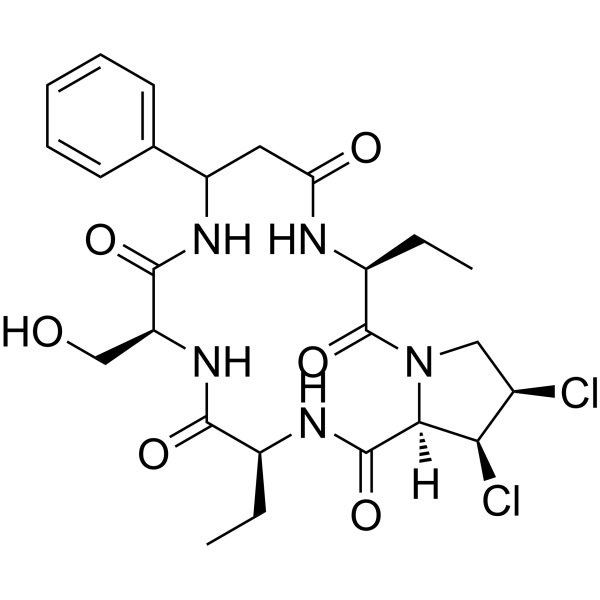
-
- HY-P2040
-
-
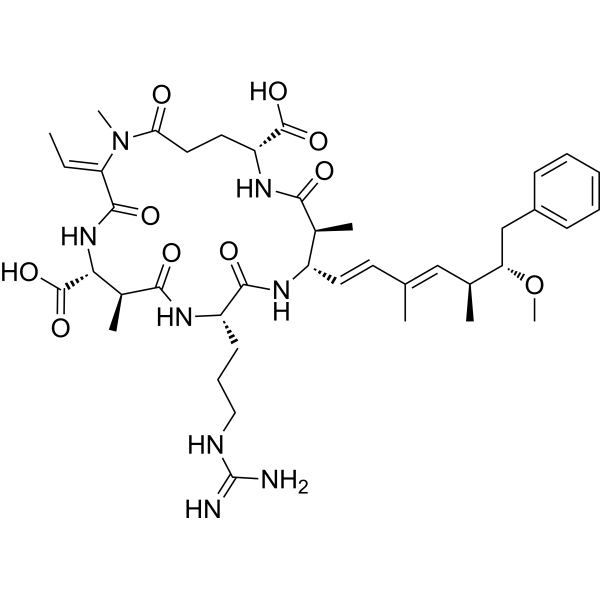
-
- HY-W019721
-
-

-
- HY-P2005
-
-
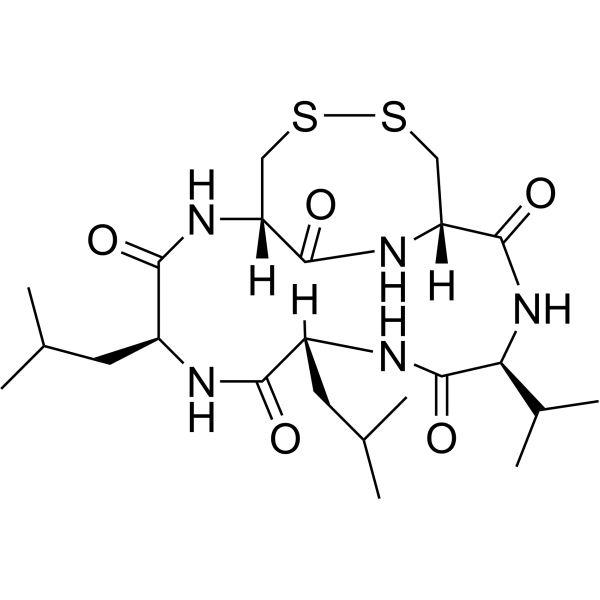
-
- HY-P5957
-
-

| Cat. No. |
Compare |
Product Name |
Species |
Source |
Compare Products
|
| Products |
|
| Cat. No. |
|
| Species |
|
| Source |
|
| Tag |
|
| Accession |
|
| Gene ID |
|
| Molecular Weight |
|
| Purity |
|
| Endotoxin Level |
|
| Biological Activity |
|
| Appearance |
|
| Formulation |
|
| Storage & Stability |
|
| Shipping |
|
| Free Sample |
Yes
No
|
| Size |
* This product has been "discontinued".
Optimized version of product available:
|
| Cat. No. |
Product Name |
Chemical Structure |
-
- HY-B0167S1
-
|
|
|
Salicylic acid- 13C6 is the 13C-labeled Salicylic acid (HY-B0167). Salicylic acid is a precursor to and a metabolite of Aspirin (HY-14654), can inhibit cyclo-oxygenase-2 (COX-2) activity[1][2].
|
-

-
- HY-B0167S
-
|
|
|
Salicylic acid-d6 is a deuterium labeled Salicylic acid. Salicylic acid inhibits cyclo-oxygenase-2 (COX-2) activity independently of transcription factor (NF-κB) activation[1].
|
-

-
- HY-A0273S
-
|
|
|
Propyphenazone-d3 is the deuterium labeled Propyphenazone. Propyphenazone is a pyrazolone derivative with anti-inflammatory, analgesic and antipyretic activity, Propyphenazone-based analogues as proagents and selective cyclooxygenase-2 inhibitors.
|
-

-
- HY-66005S2
-
|
|
|
Acetaminophen-d7 is the deuterium labeled Acetaminophen. Acetaminophen (Paracetamol) is a selective cyclooxygenase-2 (COX-2) inhibitor with an IC50 of 25.8 μM; is a widely used antipyretic and analgesic agent. Acetaminophen is a potent hepatic N-acetyltransferase 2 (NAT2) inhibitor.
|
-

-
- HY-17509S
-
|
|
|
Deracoxib-d3 is the deuterium labeled Deracoxib. Deracoxib, a selective cyclooxygenase-2 inhibitor, is a non-narcotic, non-steroidal anti-inflammatory drug (NSAID).
|
-

-
- HY-118139S
-
|
|
|
Celecoxib-d4 is the deuterium labeled Desmethyl Celecoxib. Desmethyl Celecoxib (compound 3b) is a selective cyclooxygenase-2 (COX-2) inhibitor (IC50=32 nM) with anti-inflammatory activities. Desmethyl Celecoxib is an analog of Celecoxib and with the optimal yield of 75%[1].
|
-

-
- HY-119447S
-
|
|
|
Mavacoxib-d4 is the deuterium labeled Mavacoxib. Mavacoxib is a selective, oral long-acting cyclooxygenase-2 (COX-2) inhibitor and a long-acting non-steroidal anti-inflammatory drug (NSAID). Mavacoxib is used to treat pain and inflammation associated with degenerative joint disease in dogs[1].
|
-

-
- HY-66005S1
-
|
|
|
Acetaminophen-d3 is the deuterium labeled Acetaminophen. Acetaminophen (Paracetamol) is a selective cyclooxygenase-2 (COX-2) inhibitor with an IC50 of 25.8 μM; is a widely used antipyretic and analgesic agent[1][2][3]. Acetaminophen is a potent hepatic N-acetyltransferase 2 (NAT2) inhibitor[4].
|
-

-
- HY-66005S
-
|
|
|
Acetaminophen-d4 is the deuterium labeled Acetaminophen. Acetaminophen (Paracetamol) is a selective cyclooxygenase-2 (COX-2) inhibitor with an IC50 of 25.8 μM; is a widely used antipyretic and analgesic agent[1][2][3]. Acetaminophen is a potent hepatic N-acetyltransferase 2 (NAT2) inhibitor[4].
|
-

-
- HY-N0523S
-
|
|
|
Gallic acid-d2 is the deuterium labeled Gallic acid[1]. Gallic acid (3,4,5-Trihydroxybenzoic acid) is a natural polyhydroxyphenolic compound and an free radical scavenger to inhibit cyclooxygenase-2 (COX-2)[2]. Gallic acid has various activities, such as antimicrobial, antioxidant, antimicrobial, anti-inflammatory, and anticance activities[3].
|
-

-
- HY-66005S4
-
|
|
|
Acetaminophen- 13C2, 15N is the 13C and 15N labeled Acetaminophen[1]. Acetaminophen (Paracetamol) is a selective cyclooxygenase-2 (COX-2) inhibitor with an IC50 of 25.8 μM;is a widely used antipyretic and analgesic agent[2][3][4]. Acetaminophen is a potent hepatic N-acetyltransferase 2 (NAT2) inhibitor[5].
|
-

| Cat. No. |
Product Name |
Application |
Reactivity |
-
- HY-P80091
-
|
PTGS2; COX 2; COX2; COX-2; cyclooxygenase; cyclooxygenase2; cyclooxygenase-2; hCox 2; PGG/HS; PGH synthase 2; PGHS 2; PGHS2; PHS 2; PHS II; PHS2 ; Prostaglandin endoperoxide synthase 2; Prostaglandin G/H synthase 2 precursor; Prostaglandin G/H synthase and cyclooxygenase; Prostaglandin G/H synthase 2; Prostaglandin H2 synthase 2; TIS10II; PGH2_HUMAN.
|
WB, ICC/IF, IHC-P
|
Human, Rat |
|
COX2/Cyclooxygenase 2 Antibody is a non-conjugated and Rabbit origined monoclonal antibody about 69 kDa, targeting to COX2/Cyclooxygenase 2. It can be used for WB,ICC/IF,IHC-P assays with tag free, in the background of Human, Rat.
|
-
- HY-P82796
-
|
cyclooxygenase-2; COX-2; Glucocorticoid-regulated inflammatory cyclooxygenase; Gripghs; PES-2; PHS II; Prostaglandin H2 synthase 2
|
WB, ICC/IF, IP
|
Mouse |
Your information is safe with us. * Required Fields.
Inquiry Information
- Product Name:
- Cat. No.:
- Quantity:
- MCE Japan Authorized Agent:





























































































































